#the parallels....the themes.... the narratives (doomed from the beginning of course)......
Note
honestly would LOVE to hear your thoughts on the nikolai duology because i really only see blanket praise or blanket hate for it whereas I see a lot of wasted potential. Bardugo's actual writing was beautiful as ever for the most part, but the choice of the plot/beats feels baffling to me. I love Nina, but her parts felt so separate from the rest of the book until the very end, and even that felt off. I liked the first 2/3 of KoS enough, dealing with the monster, political tensions, 1/2
and even the cult of the starless saint was at least interesting because dealing with people trying to rewrite the narrative of their greatest enemy (who hurt these young leaders in deeply PERSONAL ways) was really compelling (making him literally come back was. a choice) but I feel like somewhere in the last third, KoS went in a wholly differeent direction, and RoW has this vibe of feeling like she definitely wrote it after reading the show scripts or even seeing some footage. idk. 2/2

I will try to be brief (1/12)
Hey anon! Thank you so much for asking this even though it took 38756588247834 years to answer this I’m so sorry !! The Nikolai duology was good—wonderful too maybe because of the myriad of themes and topics it discussed and explored, all in addition to how beloved these characters are. For me, it’s the end of KoS as it is for you, and the entirety of RoW in particular that irk me the most.
I have very little issue with KoS, and I agree with everything you’ve said. The political tensions, the sort of urgency in trying to secure a country at the cost of personal reservations, preparing for a war that seems unforgivably near the door, etc. was all thrilling. After all, it is the first installment in the duology, and it’s supposed to set the course for the upcoming books.
KoS managed to introduce the stakes and the circumstances, lay the rails for what the characters will face and what it might mean to a vast set of entities connected to the events. And it’s hardly out of sense to expect Rule of Wolves to pick up where the previous book left off and carry forward the themes and plot points introduced in the first book.
Except, RoW failed spectacularly in that aspect.
Rule of Wolves: the second book, and the supposed finale to the Grishaverse and the Nikolai duology; it fails to continue the other number of threads that KoS set up for it, effectively compromising the characters, their characterizations, the themes and other political tensions and stakes. The due importance that should be given to the heavy set of topics that get brought up in the povs are not through, nor are the small details that Leigh added to the conversations evolve into something worth talking about, which are the actual points that could have been given some more page time to explore than just making them facts or points of nostalgia for the characters.
If you take a step back and analyze the whole timeline, events, characterization, objectives of the arcs and the plot points etc. etc., all the way from Crooked Kingdom to Rule of Wolves, there’s so much that is left out and tied in, quite haphazardly, which leads me to believe that Leigh wanted to attempt writing a duology that is more plot-driven than it is character driven. And we know that Leigh writes character driven stories brilliantly, and SoC, CK and TLoT are testament to the same. Heck, even TGT has more consistency than whatever TND has.
So, objectively? Plot possibilities? Characterization? Potential? Personal goals? Addressing the very serious themes it brought up, in little or major light, but give no proper elaboration about them?
The lost potential readily compromised the characterizations of many characters, and it all amounted to their arcs being very underwhelming.
I’m dividing this into four parts and here’s the basic outline.
Writing and Plotting
The Plot, Possibilities and Potential.
Characters, Characterization, Character Potential.
Remedy (what I think would've worked better to tie this all up)
This can get very looong, so be forewarned.

I. Writing & Plotting
Now, Leigh Bardugo’s writing is exceptional, no doubt. The sentences are short and flowy, and convey the tone, psyche, environment and the setting and its effects on the pov character marvellously. It's also immersive. It’s the same in Rule of Wolves, except, a little or a lot weaker.
The two main parts of this is that one, that Leigh slightly overdid showing a lot more than telling, and two, that the RoW (and perhaps KoS too), was more plot driven than character driven, the latter of which is actually Leigh’s strength.
In Rule of Wolves, Leigh’s writing seemed very choppy and snappish. The descriptions were lacking, or maybe that’s just me wishing for more internal conflict and dilemma, and going back and forth in one's own head for a bit. It felt like she showed more than she told.
Example being how Zoya ‘snaps’, ‘drawls’, ‘scoffs’, or ‘scowls’ less, and even if that’s supposed to be show Zoya beginning to be a little less unpleasant than she usually is, the tone in those chapters was not strong enough to distinguish how and why the character was acting a certain way. Nor pinpoint an explanation on what brought that change about. (And there were many instances like this with many other characters), which resulted in the characters themselves feeling so off to me.
Leigh’s characters are important to the story. They carry tremendous weight and actively contribute to the plot. Except, by focusing a lot more on the plot, some parts of these characters’ relevance was not up to the mark. It is greatly due to how weak the plotting and pacing of the book was, tbh, more than just her writing.
Consider: Mayu Kir Kaat. She is integral to the story, but she is thrust into responsibilities, and that doesn’t give us much time to see her as a person, and then as a person with a duty, like we see with most other characters. Whatever parts of her we did see were very circumstantial and timed, which is probably the reason why not many we’re unable to appreciate Mayu as much as we should. (Maybe fandom racism also plays a part, so, well,,,).
Like, we know from Six of Crows and with The Language of Thorns, how great care went into describing the characters’ state of mind, which further heavily influenced their choices and decisions. This time though, I think she wanted it to be more plot driven, hence the whole crowded feeling of the book and general worry about oh my god too much is happening, how will all this be solved and all that.
And this, I think, greatly hampered Leigh's writing, leading to unsettling and rather unsatisfying character arcs. Not to mention that there was quite little space given for the characters to develop or let them grow in a satisfying way which touches on most of the elements and themes that get brought up with regard to their powers and potential,,, and when it was indeed brought up, it was all in vain since they were never followed through.
That's one of the biggest problems for me in RoW: Plot points brought up in KoS were not brought forward in RoW.

II. The Plot, Possibilities and Potential.
Phew. Truly buckle up because this train has too many coaches. And to discuss them all, let’s keep the starting point as Crooked Kingdom.
a) Parem
Now, by the end of Crooked Kingdom, we know some important things about the parem.
It's dangerous asf for the Grisha who have to sacrifice their will and capabilities for a short time superpower high that they didn’t even ask for
Which means they are more often than not forced to consume the drug
Shu Han is the creator of the Parem and are also creating a new kind of soldiers called Khergud (who additionally require Ruthenium, but we’ll talk abt that later)
Fjerda snatched the formula after kidnapping Bo Yul-Bayur, keeping him away in the Ice Court and in their possession, and used the Parem to further their own heedlessly heinous agenda
I think it’s easy to understand how KoS started off on the right track, considering that Kuwei Yul Bo is mentioned, the antidote and jurda is brought up and so come the political tensions alongside it (what with the impending war, the demon, the lack of funds in the coffers and security and peace for the country alongside safety for the Grisha).
The point is, parem is a character of its own. CK was its inception, and its fate was decreed along with its lifespan and its doom. Ideally, by the end of RoW, parem should have been vanquished while addressing its nature as a deadly drug, the addiction and aftermath, and the key person who will guide the plot: Kuwei Yul Bo.
Parem is a political tool that pitted countries against each other, making one another their allies or enemies. (Though parem is not the only one factor). Ravka doesn’t yet know about Kerch’s neutrality. The Shu made their move to assassinate in the end, just as Fjerda cleared the air about their goals.
Point is, parem is weapon, a new kind of warfare that keeps getting alluded to in KoS. The first book gave a glimpse of how the Shu and Fjerda are using parem, thereby exploiting, prejudicing etc. the Grisha in their countries. Khergud whose humanity is washed away with parem + ruthenium, and the Fjerdan Grisha (are targeted) drugged and exploited while be subjected to torture, training and imminent death, parametres of these outcomes being severely gendered.
Ravka too wanted to weaponize it and create a usable strain that would still give the Grisha their powers but at a minimal cost, until Nikolai’s conversation with Grigori convinces him out of it and to use only the antidote for the Grisha.
And when are the contents of this conversation brought up again?
Never.
Another aspect of parem (that the conversation also covers) is this: that what was once merzost, parem is its strange cousin. Parem parallels breaking the bounds of Grisha norms unnaturally, while merzost takes it a step further to break the bounds of nature itself, which comes with a heavy price. They're both the same with little differences. Amplifiers are in tune with this discussion, hence the conversation between Zoya and Nikolai about how, and whether or not the abomination in him, the parem, and the amplifiers are tied together. This gets brought up again in the conversation with Grigori.
Parem parallels the superpowers, something that Zoya too manages to achieve once the corruption of the amplifier business is resolved, which makes her realize how in tune with nature the Grisha must be, and how limited the Grisha powers until then had been. And why the amplifiers were a corrupted piece of magic.
Zoya was supposed to be the conduit in that sense that she reversed the Grisha norms and understood the importance and nature of small science. This is alongisde parem getting abolished or resolved in the least, be given a redressal.
Yet instead in RoW, we barely see any of Zoya’s powers, nor even her experimentation and hunger for power which would give her protection. We don't see how she begins to realize that while power was indeed protection, it was also a responsibility. Not clearly, anyway.
So like, not only is this entire discussion thrown away in Rule of Wolves, but no matters are resolved either. Parem did not reach its end like it was supposed to. Merzost with regard to parem would have been an excellent thing to address, with or without the Darkling being present, because the blight is there. But that doesn’t happen.
What happens instead? We get one chapter of Grisha getting the antidote during the face off at the start of the book, the women in Fjerda are not brought up again and instead we jump to Shu Han. Kuwei is also conveniently forgotten because hey, the Zemeni are here so it’s all sorted!
RoW could have (should have actually) sought to address both the political and medical (?) aftermath and implications. Maybe it did succeed in showing the political side of it, with regard to Mayu, Ehri, Makhi and Tamar’s storylines. But that’s only in Shu Han, whose state of affairs we had NO idea of until RoW. No idea, so much that it was completely out of the blue.
And what we did know (get to know about in KoS) is Fjerda and the affairs there remained… unsolved.
(...sorry).
b) Grisha Powers
Re: From the conversation between Nikolai and Grigori, and Juris and Zoya, about how parem and the amplifiers are parallel to each other in terms of being abominations, a corruption of Grisha powers. Now the theory of it is not entirely explained, but we do know that the parem and whatever Zoya learnt from Juris was meant to move along in the same direction.
But we don't see another mention of it, except maybe we could dig a little deeper and realize that it all adds up because Zoya is the Grisha Queen of Ravka, Summoner, Soldier, Saint, all of it rushed and unnecessarily magical in a war so dire and realistic in RoW.
Welp.
c) Spy business
Just… genuinely what even was Nina up to in RoW? A spy, sure, but only to garner information on the pretender?
Why couldn’t there have been two responsibilities for her to uncover: the lies or truths about the pretender while the Apparat causes hindrances, and Nina trying to seek out more documents of the locations and labs where the Grisha women are being tormented and the other Grisha being weaponized? It could have been a leverage to discredit Fjerda in front of everybody in the Os Kervo scene. Imagine if Nina whipped out the documents of Grisha labs and brought the truth of the exploitation and killing and kidnapping etc. in front of the convention of all nations. All of it together would have upped the political tensions by quite the notch.
Even then, there’s a possibility that it wouldn’t matter either because the Grisha aren’t exactly valuable to all the nations. But killing and exploiting is still wrong so maybe it might have worked? Or see, even if it wouldn’t have, the slow and sluggish realization of Mila’s identity by Brum, and alongside writing it as a tragedy where Nina’s efforts seem to have gone to waste, or where Nina is telling Zoya about not accounting for Prince Rasmus’ word and she informs her about the documents she has snatched? Something could have been done here?
The point is, KoS focused on Fjerda and its unraveling, and it wasn’t continued with and through in Rule of Wolves. Instead it sought to find the problem in a whole new country, Shu Han, and fixed it within the same book leaving the other country as it is.
d) Ruthenium and the Blight
Ruthenium, the metal that is an alloy of regular metal and Grisha made steel, could have been utilized more significantly in the books.
I mention it in association with the blight because while on one hand it is true that the blight is an area full of nothingness, ruthenium as a metal could have been utilized to show the effects of rushed industrialization that is leading to the ground losing its essence. This is supposed to be advanced warfare after all. Besides, Makhi loses someone very dear to her. Perhaps ruthenium is more dangerous in Shu Han because the Shu use it to create the khergud, so the constant manufacturing of it has been leading to the metal leeching the lands of their fertility, along with the blight.
And so also to broker peace, Ravka could have provided aid in some ways. :
1) The Darkling sacrificed himself, as a result of which the blight vanishes. While the blight took away her niece, the possibility of a blight persisting despite the ending of RoW could be attributed to ruthenium.
2) Ravka could provide the reversing effect to the alloy of ruthenium and metal using Grisha and otkazt’sya engineering and ingenuity to replenish the lands.
All in addition to whatever will be Shu Han’s policies to bring lushness to their lands.
e) Women and War:
Holy fucking Shit, where do I start with this?
Whatever we saw in Fjerda was haunting, and we see it from Nina’s chapters. There’s literally no resolution for it, nor is it ever brought up again, at all. In Zoya’s chapters, we see through her eyes the brunt that Grisha faced with the war, and in a country that has refused to recognize Grisha as the citizens and considers them expendable.
Add to it her own narrative of how the women are never mentioned, let alone the ones that she has lost or has known to suffer, at the hands of the war, at the Darkling's torture and powers. The description of these women suffering, often being forgotten and thrown aside as mere casualties… where or when was it ever going to be brought up again?
Like, switching between such horrifying things happening in Fjerda to whatever was happening with Zoya and Nikolai and Isaak is such a contrast, horrifyingly demeaning and insulting, even more so when it failed to align with the importance of parem and offer a solution to both these problems.
Now switch to Rule of Wolves, where the Tavgahard women immolate themselves on Queen Makhi’s orders. Not only is that such a cheap and insensitive thing to do, it gets treated a simple fucking plot point in the book, and it barely gets addressed afterwards. Women in Asia have a vastly complex and complicated history with fire, and this is a serious criticism that culturally affects readers in personal ways. And what gets done about it? Fine, Zoya feels baaaad, sorry oops why would the women do that?!?!?
Where is the adequate sensitivity to the topic? Where is the continuation of the pain Zoya feels for many people, despite them being the enemy? How does she honour them? Where is all that dilemma and pain? Why does she not think of them or just get a line or two to talk about them?
Where is the due importance for this suffering given? Structurally and culturally?
f) Soldier, Summoner, Saint / Yaromir the Great
We never really get any explanation for why Zoya deserves to be the Queen, and why she is the best. But we do get to see why Nikolai isn’t the one supposed to be on the throne, and it’s not just because of his parentage but also because of his failings and doubts and the need for acceptance with the secrets he carried.
Here's the thing though; it’s not just about her showing mercy. It’s very subtle, and in good sense, should actually have been given a little bit more importance that be loosely brought up at random times.
Keeping aside the fact that Zoya is representative of Ravka—a woman, a Grisha, a Suli girl who changed the course of war and who knew what it was like living in poverty, being as an underprivileged person of the society in addition to the trauma from then and the state of living at her aunt’s place—which is meant to be covertly apparent, the other reason tracks back to Yaromir the First, who with the help of Sankt Feliks of the Apple Boughs—the one who raised the thornwood—lead Ravka at that time into the age of peace.
The Darkling testified that in his POVs, that while Feliks and Yaromir worked in tandem for Ravka, Aleksander worked for safeguarding the Grisha. In one sense, Zoya is supposed to reflect that moment in history in the present moment, except she is Queen and Sankta, and Grisha, all three at once.
It is brought up in one of the Darkling’s POVs and once in the conversation with Yuri in KoS. Other than that, we never actually get any more hints of this explanation in the text, which is the reason why the entire ending felt so so rushed, and like a fever dream, that even if it was a plot twist, it was kinda very baseless when it should have been more ohhhhh sort of a thing.
g) The Starless Cult and Saint Worship
This cult had immense potential to blossom into many things, some of which were indeed touched upon in KoS when Zoya says that she saw a bit of herself in Yuri, and brings up time and again how easily she’d been led and had not been aware enough of what’s right and wrong, just as she supposes Yuri is too. And to some extent, there is truth there, because in the Lives of Saints, we do see why Yrui comes about to hail the Darkling and how it parallels Zoya’s, of being helpless and ten being saved by a different power/ their own power, respectively.
That’s where it forks, that Zoya is older and realizes the path that Yuri has chosen and understands that it won't happen until he realizes it himself because the Darkling’s crimes are so obvious.
Even then, there’s still more potential: This cult could have been the mirror that would make Zoya reflect on the questionable methods of the Darkling, and the ways in which she might be mirroring them, despite or not it is the necessity because of the war. How she is training soldiers too, just as the Darkling did, and while the need to take children away from their homes just as soon as they were discovered Grisha was abolished, it was war, and they needed soldiers.
So like, there’s quite a big narrative going on here, how mere children are pushed into one path of becoming a soldier and the whole system that was that the Darkling followed to train the Grisha and all of that. All of this in addition to the juxtaposition to the Grisha being seen as elite despite them being hunted, and the people who are not Grisha frowning upon them. This is also the work of the Darkling, which actually paves the way to see how there can be a world where the Grisha are not feared or seen as abnormal, despite or not they are given a Saint-like narrative.
This cult could also have been the segue to discussing Yuri and his brainwashing, and the sort of cult-ish behaviour of believing in something firm when you couldn’t believe in yourself, or not seeing the magnitude of the crimes of their supposed Saint, alongside always staying focused on becoming a soldier only and never actually thinking beyond what is told.
Some of these are very subtle and some are brought up, but never given too much of an explanation.
Genya brings up another good point in the funeral chapter, about how Fjerda seemingly taking into the whole Saints thing could mean that if the Darkling moved there, he could very well sprawl his influence there to bring in supporters. Which leads to another discussion that gets brought up towards the end of the book: about Nina telling about the Ravkan Saints to Hanne and therefore to the Fjerdans,,, which doesn’t exactly sit right with me. It’s still a very nascent topic, and I think SoC3 will explore this path of faith and personal beliefs etc. but leaving it just there, while talking so much about Saints in both the countries,,, don’t exactly know how to put it into thoughts here.
But regardless, the cult of the Starless had different potential to talk of (blind) worshipping of an ideal without critically examining why the person must be put on the pedestal in the first place (and if it is simply power, then there is actually a narrative right there, which RoW gets right, about the people valuing the power still, as a result of which the monarchy still persists at the end of RoW. Even then, there’s more discussion awaiting there).
Not sure if any of this makes sense, but I’ll leave it at this here for now.
edit: 05/07/2021 | I think what I was trying to say here is that we do not have any kind of narrative evidence to seeing how and why it seems right that the Fjerdans will worship Ravkan Saints; is it merely because they are all Grisha? Or is it because of the segue explore this path of faith and personal beliefs and all of that, of the talk of the monastery and the Grisha there being of all identities, that a monastery is in Shu Han, that it has Djel's sacred Ash tree so far away from Fjerda... much to think about.

III. Characters, Characterization, Character Potential.
Mostly going to be about Nina and Zoya, but I’ll bunch up the rest of them at the end.
a) Nina
*head in hands*
I severely mourned how poorly Zoya was written in RoW, but then I realized that more than Zoya, it’s Nina whose potential was severely undermined and wasted. On one hand, I’m glad she uses her powers and quick thinking,observation and her own tactics to analyze the population and opt for the best way to make them see the truth she wants to show them (eg: making Leoni and Adrik and Zoya saints and also showing that the Grisha are the children of Djel via people’s belief to Joran and Rasmus’s mother).
But then, it’s like you said; her parts were so offbeat and outpaced and completely disjointed, when in fact, Nina is the thread that ties all the characters, their plotlines and potential, together. Nina is connected to Zoya and Hanne, two equally important characters and main characters of the duology. Whatever scope Nina has, they are greatly in parallel to Zoya and Hanne. And it’s all literally there, in the text! What a waste.
Though keeping aside these parallels, Nina’s own journey from Ketterdam to Ravka to Fjerda, while is spoken about, doesn’t touch some other parts that I see potential in. Or this is just meta.
Nina has grief not just from Matthias’ death but also from the loss of her powers as Heartrender. So much of the Second Army was built on being a soldier, and perhaps the Darkling was not outright disdainful of racial differences in his army, yet he still stripped every part of the children away until they weren’t children anymore in his view. They’re all soldiers… (albeit his soldiers, preparing them to do his bidding because hey, give and take right?). Nina was a soldier, and she is a soldier still under Zoya’s role as a General, but an ‘other’ of a soldier. That’s her only identity, and the loss of her powers means that she’s a different kind of soldier.
I imagine that this entire time, some small part of Nina longed for normalcy, or whatever settled as normal for a life like hers. In the sense that she wants to go back, but what is back and where exactly did she want to go back to? What was the before and after and where did things go wrong or change? There’s tragedy in the realization that whatever you were before what you became is not a place you can return to, and that’s a different kind of loss that she has to bear, and all by herself. She has powers over the dead now, a strange power she learns to grow to, but all the places she has been, all the lives she has led and people she had been, everything might seem like they’ve all been locked away in some strange place leaving her barren and indisposable.
She’s off to Fjerda as someone she isn’t, figuratively and literally. In KoS, Nina brings up many times how odd she feels as Mila and in some capacity longs to be Nina Zenik again. This ties in with the previous point of returning to somewhere, but where?, but is also a segue towards body dysmorphia, the thing that Nina and Hanne’s storylines parallel and connect too with in a small way. It’s a great line to follow to discuss what her discomfort with her body means to herself while it means something entirely different to Hanne, who is also not entirely comfortable being who they are. (This discomfort further which leads to gender dysphoria, while for Nina, it will be about learning to accept her powers. I’ll add on to this in a bit,).
I'm mourning the lost potential of that experience being a parallel to Hanne’s own feelings, of a discussion between people being uncomfortable with their bodies, something that can mean multitudes to each person and on their own accord.
In parallel to Zoya, I like to draw it from the fact about Nina wanting to go back to who she was, while Zoya actively tries to lock her past away and drown it somewhere or throw it to the storm, never to hear of it again. She has no identity other than being a soldier, and that’s enough for Zoya, because who she was before she was a soldier is not pleasant. But moving from being just another expendable shell of soldier under the Darkling’s rule, Zoya becomes the one third of the Triumvirate, and then the King’s general, all of which bring self-awareness of Zoya’s capabilities and challenges that are bound to excite her. But all of these also compel Zoya to be many other people to others as she slowly grows to realize that power is not just protection but also a responsibility, and it will inadvertently mean confronting her past of her lost identity, realizing the how of the Darkling, and how harmful it was. As Genya puts it perfectly in Rule of Wolves, that they were all taken away when they were young kids, not even barely children, and then thrust into responsibilities that didn’t allow them to be anything else other than what the Darkling told them to be.
Back to Nina; a few other great parts about Nina’s arc could have been about her connection to languages, as language being a mode of strengthening identity, in addition to growing to her powers. In RoW, there’s this line that goes ‘how sweet it was to speak her language [Ravkan] again’, and the feeling of homesickness. Like, Nina is trying to connect to Ravka through what she knows best—language, and then stories. In that, Nina realizes a part of her identity, which could also act as a segue to Zoya reclaiming her own heritage and ethnicity. Not only that but Zoya and Nina’s stories are literally so intertwined that it’s hard not to see how their choices and line of thought affect one another’s arcs, in the grief they have and how they choose to treat it, and also show why Zoya is particularly protective of Nina (and keeps wishing that she doesn’t become the monster Zoya had become, in the sense that Nina is more mature in handling her grief than Zoya was and the entire mercy plotline ties Nina, Zoya and even Genya together. More meta, haH).
And that’s why the ending doesn’t make sense. Even though the part about her not being comfortable as Mila is not brought up many times in the continuing chapters (and that’s why perhaps naming Nina’s discomfort as body dysmorphia may be wrong), there’s still the part of Nina readily accepting to be who she was a Mila and remain in Fjerda that seems iffy to me. Especially when Nina and Hanne literally a few chapters ago think about running away (it may be just another alternative they might be fantasizing about, but I think it still means that they both want to be their true selves without hiding any parts of it away). So her staying as Mila… well, it doesn’t exactly add up.
I’d also add the part of Nina’s story mirroring Leoni’s, and how she is from Novyi Zem and being a part of the Second Army meant that she had little to no connection with her past, her culture etc. But maybe that’s just wishful thinking on my part that Leigh went for that arc.
edit: 05/07/2021 | I don't agree with my point anymore about Nina not having the kind of ending I assumed she might have, considering that it is very well possible for Nina to treat her identity as Mila as a fresh start, as a Grisha with a command over the the dead and begin a new normal that is suited for her. You can read more here.
b) Zoya
For one, white passing Zoya is not canon to me. I simply pretend I do not see it.
See, her race was handled very badly. Making her half-Suli was supposed to show the struggles and the trauma that the ridiculing of her identity by other people has caused to her. Except, not enough time nor text is given to thoroughly discuss it. Not to forget how problematic of a narrative in itself it is to make Zoya white passing.
It would have made more sense to make her dark skinned and predominantly Suli-looking than whatever yt bs she was put through. Her not being white-passing would have led to conversations about tokenization, or people caring little about her and not giving her any respect because she is Suli. Or being called beautiful to the face and praised just for it or a harmless tumble in their point of view.
So like, instead of making the ‘mistake’ of seeking for acceptance, seeking appreciation and love, from her mother at first and then the Darkling, Zoya instead makes herself someone to be feared, if respect was not what she deserved. The iciness is a part of her and has always been, but all of it soon became a shield, an armour that she vowed to harden her heart with. Just the sheer impact of this narrative and her reluctance, and seeing Nikolai love her for beyond who she thinks she is… if all of this was canon, I’m pretty sure I’d have built a shrine for this duology.
Let’s now talk about her grief, and...
…
Okay it’s not for me to point fingers at how Leigh chose to write about grief because there’s no one way or one proper approach to go through that pain, and if that’s how she chose to write about grief for Zoya, fine! But I really wish we’d have gotten a little more into her head to see how the trauma has affected her thoughts and how she struggles against why and what exactly it is that Juris wants her to do. That enough time and text was dedicated to Zoya’s feelings and the mayhem it caused her, as a result of which the dragon’s eye took its cue and made things more unbearable to her because she was the only one to bear them all.
Like, I feel like Zoya was overwhelmed throughout the book and in between she had some skyhigh responsibilities to discharge and it’s all so inconsistent and poorly woven,,, it completely dissolved her character from KoS and made it 10000000x more miserable for me to read her POVs. And honestly, what even were her assignments that the Kirkus review mentioned? Never an inch of text in RoW is given to decipher her complications of her mind, the muddled sense of hopelessness and fear that grips her time and again. Why overwhelm her so much that you fail to do her mental state and capacity any justice?
I’m not going to be harsh about how much David’s death bothered me-- no actually fuck that; what’s the point? Fine, he died. All because you wanted to make his death a plot device to make Zoya reconcile with loss and deal with it? Where was Genya’s grief? Literally no point of having a death in the book at all, and it didn’t even achieve anything. (I’m still trying to wrap my head around why David’s death was important and maybe if I find some straws, I’ll consider…)
There were so many other ways around it; could have brought back Lada and killed her off, or have the Darkling piss her off so badly or just. Something. Instead of whatever happened with David. I think this is too harsh and insensitive of me to say about Leigh, but still… there’s a myriad of other ways to have gone about it. Helping Zoya deal with her grief with Nikolai at her side, to understand that the rage that was fueled from her loneliness, like it had been in the past, could now be a weight that Nikolai was willing to carry with her… Helping someone with their grief, staying and choosing is also a love language you know?
So in that regard, I won’t regret saying how flat the garden scene was to me. Zoya’s lines, though tinged with grief, were so out of what I would expect KoS Zoya to say. Maybe it’s also because of how bitter I was reading about David's death, despite that part being spoiled for me.
The cost shouldn’t have been David’s death, especially not when his death too wasn’t properly handled at all, and Genya’s grief was never spared a second thought beyond bringing Titanium.
+
Now let’s talk about how Out of Character Zoya was throughout the book. Her punchy attitude was missing, and even if she was warming up to her friends, we see little of the iciness she continues to retain. Another part of this is about exploring her relationships, particularly with Nikolai and her growing feelings for him. I wish we’d have seen them grapple with more of their confusion and propriety, if only for the yearning™. Besides, no matter how cute their scenes were, they were mostly (like maybe some. 70%) awful to read them, simply because it felt so odd to see Zoya be so open with Nikolai, all of a sudden.
A part of this definitely has to be the fact that we don’t know just how much time has passed between the end of KoS and the start of RoW, and we never, never see any description of they regarded their feelings for each other and how they understood it themselves. I don’t actually know how exactly I can put this into words in a manner that will make sense, but the only scenes where I appreciated Zoyalai were in the Ketterdam chapters, ONLY. The rest was… bleh lmao. Their scenes were so cute and brilliant, and if only we’d seen more of the internal conflict and had given some more time for them to practically approach their feelings but still end up in the puddle of it. If only.
Their scenes apart were the good ones, because that’s where we finally see Nikolai feeling the loss, no matter how temporary (on the verge of being permanent since it’s the war), of not having Zoya with him, of not being there with Zoya because who else would it be if it wasn’t her? Zoyalai had good scenes but they barely lived up to the mark lol. Their feelings are never thoroughly explored, nor their mental capacities.
While we’re talking about Zoyalai, let’s also talk about how lame it was for Zoya to say that Nikolai was the golden spirited hero all along, from the very start, when canonically we know Zoya had little to do with him in the earlier books, that she may have only been physically attracted to him and never saw him as more than just some guy with a responsibility to manage, and had sooooooo much distrust about him. And that it was only in the next few years of working with him and alongside did she grow to recognize his efforts and relish in the hope that he was building for Ravka, inadvertently making Zoya hopeful too.
Nope. Instead, we’ll just throw in some destiny bs that he was the one all along rather than show that the beauty of their relationship did not stem what they perceived of each other, but was instead built on strong respect and admiration for one another and their capabilities. 100% destroyed their relationship for me.
+
Some good parts about Zoya’s arc in RoW was how she acknowledged her past mistakes, and the nuance that was touched upon in seeing sense in becoming a soldier from the start, that offered her a chance to be anything other than a bride. That some part of her was grateful for the Darkling for teaching her how to fight, while still keeping Genya’s words in mind about how they were mere kids, children who had only one path to traverse because the Darkling (who wanted their acceptance and loyalty) nor the Kings of the country let the Grisha be anything else other than pawns of the war. That she recognizes her mistakes as a teen and how self centred she was, that her being snotty had at times cost some peoples’ lives too. And she doesn’t take the blame all up on herself, because it’s not hers alone to bear. Super good.
Also, the way Zoya comes to view power as responsibility instead of merely as protection was something cool to read about. It’s not clear in the books, but Zoya actively tried to not be the Darkling while still continuing to build an army for the war out of necessity, and actually sharing some parts of the dream that the Darkling had for the Grisha. I can’t articulate this so perfectly, but the point is, Zoya trying to avoid becoming a tyrant like the Darkling was an active process that she was constantly trying to change, and where Zoya could not recognize her own feelings and inherent thoughts about warfare that in some ways did mirror the Darkling’s, by the end of book, Zoya is much more self-aware and conscious of herself and her power than she was at the start of the book. And this was well done.
+
Now, what is up with YA and making people turn into giants or animals lol wtf. Why couldn’t we have seen Zoya use her dragon powers in a way that symbolizes the conditions of her dragon amplifier and the power of the knowledge she obtained from Juris? She is a Saint, and we’ve seen that their powers allowed them to cause ‘miracles’ and such, as we see at the start of KoS and at the end.
Why couldn’t we have seen Zoya dabble with her newfound powers and completely lose her shit in anger during the wae, only to rein back in mercy, just as someone from Fjerda begs for forgiveness since they see her then as a Saint? Adrik and Leoni used their powers in Fjerda, so having Zoya bring about a conundrum of all orders and do something about it would also have been cool, wouldn’t it? In the funeral scene we see her turn water into ice, thereby making a path for Genya. Why couldn’t we have had more exploration of the importance of the dragon’s eye and the general nausea of being overly empathetic every. damn. time? Why didn’t we get to see her powers? Why couldn’t we have seen her fail in them and realize that the reason she was not perfect was because she was trying to be strong on her own and was not relying on others and joint effort?
Her turning into a dragon was genuinely the most baffling part bc here’s a war that’s so serious and dire with metals and bombs, and then here’s this magic that will solve all of it entirely. Like I’m not saying it was bad, (I am actually saying just that) but I also don’t know what I am saying, except that the ending felt like a fever dream.
…?
Not sure if I’ve managed to convey it properly, but well. Zoya felt out of character throughout RoW, and that the only place I saw KoS Zoya was in the final Os Kervo scene where Zoya finally agrees to be the queen.
c) Nikolai
Nikolai’s arc was very satisfying and brilliant to read about in RoW. In KoS, he seemed very much like a passive character, one of the reasons why his stunt with the Shu in RoW was appreciable, no matter how ill-timed of a plot turn it was. His journey throughout this book was also introspective to see why others deemed him unfit as the King, and even if they were his enemies who thought that in want to dispose him from the throne, Nikolai realizes that him being on the throne is not of much value and that this book was entirely about him seeing his privilege and making decisions to counter and correct the mistakes he’s made. That was nice. Oh, also his father not being an antagonist was a pleasant surprise.
I don’t have many complaints about him, except perhaps wanting some more internal conflict and elaboration about his feelings for Zoya. Them being apart was where it was satisfying, and then in the Ketterdam chapters. His arc could have been better in KoS, but that’s to blame the plot for the characterization.
d) Hanne
Now, from the very start, their arc was super good and it only got better and better until… the ending. Except it’s so odd that Hanne, a poc, has to now live as white person, while feeling comfortable in their transmasc identity. Icky, no? That you need to eliminate one part of your identity in order to feel safe and comfortable about another? Add to this the whole white-passing Zoya thing,,, doesn't exactly send off the right message.
Together with Nina, the ending seems uncharacteristic for both of them. Them coming to accept their powers and knowing to use their powers on their own accord was brilliant, though the entire husband business felt very,,, eh to me, even if it did make sense. The ending about their name and their new identity was too vague.
e) Genya, Leoni and Adrik, Kuwei, Mayu,
Genya is the one who faced the most disservice along with David. While there were exceptional parts to both of their plotlines, it's still sad that even if David's death was necessary, we don't get to see the entirety of her grief and the possible anger, and that her kindness is simply used as the justification for lack of portrayal of grief.
It really did take me by surprise, mostly because I wasn't a fan of the original Shadow and Bone book, but seeing David's conscience and self-awareness, along with Genya's (and Zoya thinking of how she wouldn't let any harm come to them, which shows a bit of her development towards her character development), was plenty refreshing. David and Genya were genuinely the highlights of the book and to kill David off was just. doesn't sit right with me.
Leoni and Adrik deserved more page time. They’re saints and immensely capable (no wonder they’re now the Triumvirate), but a few more pages for them to shine would not only have been nice, but also a necessity.
And now, Kuwei...
....
I mean,,, parem should have been the plot, alongside the entire weaponry and the discussion of making a city killer. But uh… that didn’t happen.
There's not much I have to say about Mayu, Tamar and Ehri, except that their plot was superb, only very badly timed.
There's more to talk about them in the remedy tho.

IV. Remedy
Here’s the deal. Before KoS release, there should have been a Nina novella.
Nina is a very important character. All of her potential, alongside many other parts of her personality--from dealing with grief, to accustoming to her powers, to growing stronger--there could be so much to do with her as a protagonist, alongside another character: Mayu.
A whole book dedicated to Nina in Fjerda with Hanne? Brilliant. Show Stopping. Mind blowing. It gives SO much page time to explore not just Nina and Mayu, Hanne, but also Zoya, Leoni and Inej. All together.
How?
Nina’s plotline carries the entire medical effects of the use of parem, just as Mayu’s will carry the pain she feels about her brother being a part of the khergud program. The novella will give ample time to flesh them out as characters and protagonists, each dealing with plot problems and problems of their own--like the loss of ones powers and newfound responsibilities, and the shared loss of a beloved person in parallel, even if neither Nina or Mayu interact on page.
Fjerda and Shu Han could be tied together with one chapter as a POV from Zoya (or maybe two), who, along with the Triumvirate and Nikolai, are completely at loss with the political scenario in the country, and are debating over what should be the course of action. Zoya receives news from the scouts, and missives from Nina, and Tamar takes care of the information she garners from the rest of the network, including Shu Han.
Like, the entire surprise of finding a Zoya POV, from a character whom until CK we’ve known as cold hearted and stern and not giving a fuck about anything or anyone, be humanized in that one chapter, thereby building up the anticipation for her arc,,, the very potential,,, *chef's kiss*.
And by the end of book, we could have an POV--or maybe a cameo if not a POV--of Inej meeting Nina on one of her travels of slave hunting. Inej could help take care that the women that Nina has rescued (as Nina does in KoS) reach the Ravkan shorelines safely. But, for a price.
The entire parallels between Leoni and Hanne and Nina could be set up, while also building up the narrative for the Saints’ plotline with Adrik's, Leoni's and Nina’s powers (like it was at the end of KoS). KoS and RoW would thereby continue it by tackling the weaponization and the antidote, Sainthood and the rest of the politics of it all.
Coming to Shu Han: one key aspect that I’d love to have explored would be the importance of art, during or despite the war. Of how war or pain chips away culture, while detailing on the ill effects of it from the commoners' perspectives, from the soldiers etc. Art is integral to Shu Han and could be portrayed by Mayu’s pain finding balm in poetry, of seeing glimpses of Ehri poring over poetry also mayri ftw, of politics that Makhi is weaving against Ravka, etc.
Or also add some more length to Zoya’s POV and explore a bit of Tamar and Tolya and Kuwei’s interactions and perspective added to it, of missing a home that they seemed to not know, or know; of discussing culture and differences on the basis of where they’re from (maybe the twins are from the borders, while Kuwei grew up near the capital or somewhere distant from the borders etc.), all while directly pointing at Zoya’s heritage and how it ebbs at her conscience, no matter how much she wants to bury it.
POTENTIAL !!!
Like,,, Nina novella would have been too powerful. It would have been perfect. I think I’d excuse bringing back the Darkling too if this was the case. (Or maybe not).
But welp.

Hey, thanks for reading! Not sure if you could make it this far, but if you have, you honestly deserve a medal for sitting through this all. I can’t imagine how tiring it must be to read through this, considering it seemed to take it more than month to compile this there’s also me procrastinating on it too so i’,mbhbdhshfsdn
Drop an ask if you want to talk more about this!
Sincerely, thank you!!!
#zoya nabri#zoya nazyalensky#nikolai lantsov#nina zenik#hanne brum#grishaverse#king of scars#rule of wolves#kos#row#the darkling#row spoilers#<<< if you want more thoughts. i rambled quite a bit in tags of posts i reblogged after row came out#and they're all tagged as row spoilers. check them out if you want#im definitely not sure if this was what you wanted to talk about but i rambled away anyway and ykw#thank you for enabling me fdgsfdghjkds#pinned#didn't include the darkling or alina or mal or the crows well simply because#now watch everybody like this and not reblog lmao#can't get a reblog on this fucking site
155 notes
·
View notes
Text
LO Fans: "I love Lore Olympus because it deals with serious themes, like sexual assault, abuse, gaslighting, trauma, and mental health issues!"
Me, who spent my life discovering and obsessing over masterpieces like this:
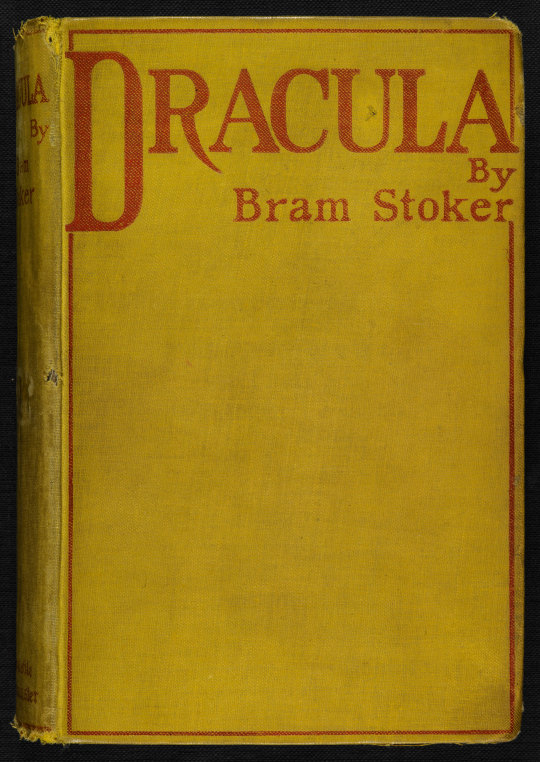
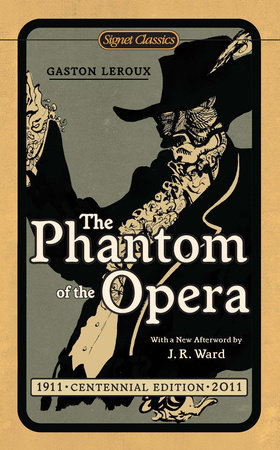
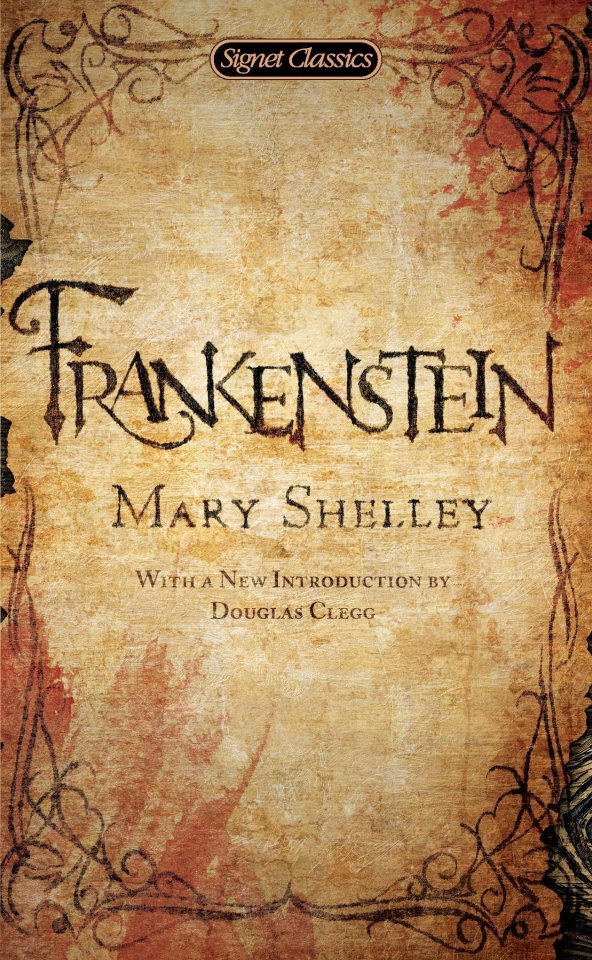
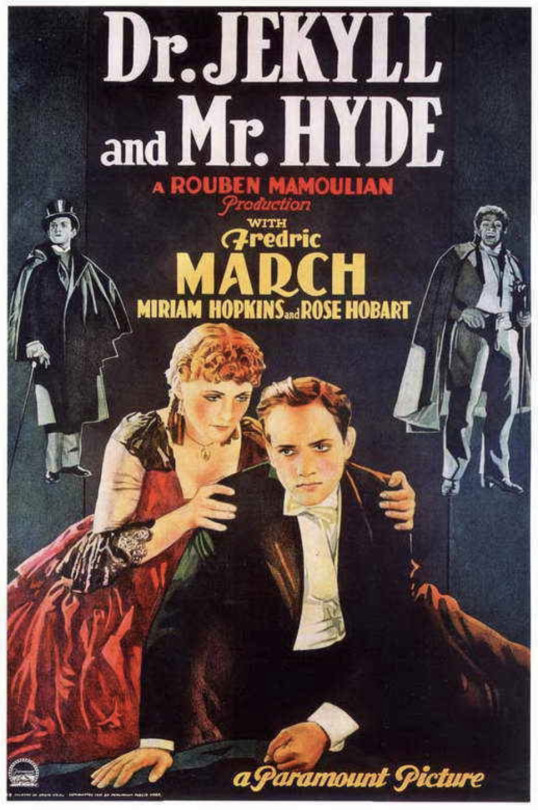
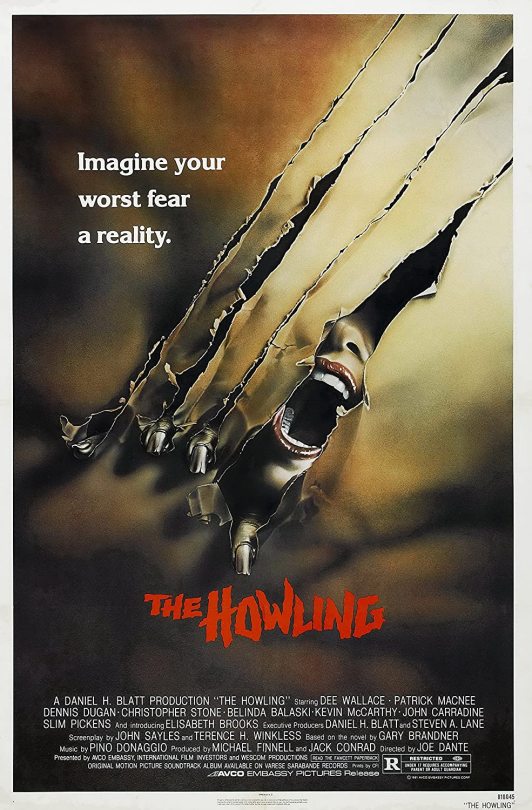
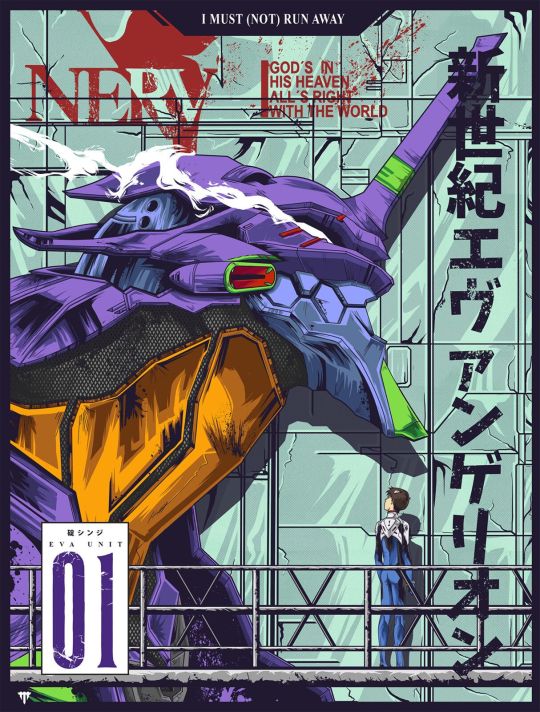
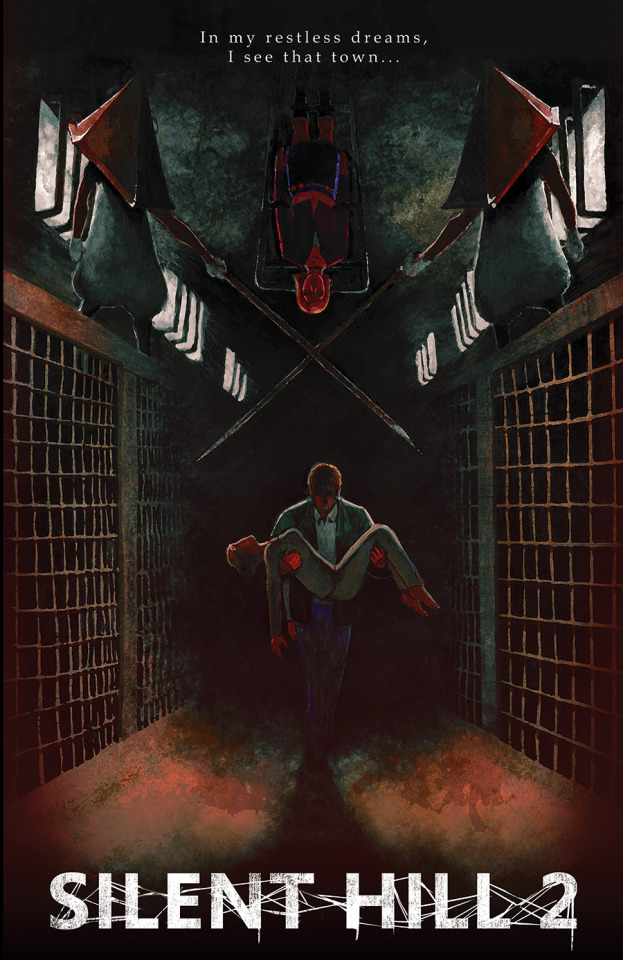
"You're gonna have to try a lot harder than that to impress me."
Yeah, I never understood that kind of praise. For one thing, people act like LO is groundbreaking for that reason, despite there being countless movies, books, tv shows, comics, and video games that also deal with the same themes. That isn't to say there can't be more stories like this, however. I, for one, am begging for another video game that comes close to the emotional resonance of Silent Hill 2, or for a faithful adaptation of Dracula and/or Phantom of the Opera, or for a horror movie as unsettling as The Howling! But to say any new story that deals with these themes is unique for doing so, is just simply not true. Lore Olympus is no more unique than any of these stories. Also, I don't understand the praise that Lore Olympus is great just by virtue of having these themes in the first place. Just because a story has serious themes, doesn't automatically make it good. Far too often does LO use its themes as a crutch for a plot that is standard issue among romances, as opposed to stories like The Howling, which has a very intriguing, outlandish plot that serves as a catalyst to explore themes of very real and relatable horror. Lore Olympus, without its intense themes, is just another story about the CEO falling in love with his intern. And don't get me wrong, I LOVE those kinds of stories, but Lore Olympus just doesn't really do it for me. And the poorly executed themes just hamper it even further for me.
If it wasn't already apparent, has anyone noticed a pattern between these titles? All but one are horror stories. In my opinion, that is one of the key differences between them and LO: Horror! The themes within, are ones that illicit terror, and the stories reflect that (even Phantom of the Opera--don't listen to anyone who says it's a romance). Starting with Dracula, one of the scenes that horrified me the most in the book was the one where Count Dracula sneaks into Mina's bedroom. The book describes him slitting open his own vein and forcing her to drink his blood. Mina then expresses feelings of violation, much akin to what rape survivors feel. It doesn't pull any punches in its shocking, horrific portrayal, but it never comes off as exploitative. That's because the best horror stories rely on the audience's empathy. In this case, nobody wants to feel violated, so we feel as horrified as the characters do when we read about this grotesque event. And because it is about illiciting fear through empathy, Dracula succeeds where Lore Olympus fails. Lore Olympus, before all else, is a romance. And rape should not be in a romantic story. Especially not when the narrative of LO uses this trauma to validate the relationship between the two leads. I'm not a fan of stories that use trauma to validate a relationship between romantic interests, and I think that partly stems from reading the Phantom of the Opera.
If you ask me, Phantom of the Opera is one if the best books to discuss abuse and gaslighting ever written! Despite misconceptions generated by the popularity of the musical, PotO is very much a horror story with hardly any romance at all. And it's one of the best examples about why using trauma to validate a romance is a very bad idea! You see, all the conflict of the story begins with The Phantom and his trauma. He was born with multiple physical deformities that cause him to look like a living corpse. Because of this, he is despised and rejected by the world in order to escape the hatred of the world, he commissions the construction of the Paris Opera House, complete with intricate catacombs where he can live out the rest of his miserable days. Then one day, a woman named Christine comes to work at the Opera as a chorus girl. She is sad and alone due to her being orphaned, without a friend in the world. She too is emotionally damaged and the Phantom thinks this means she'll understand him. The trouble begins instantly when he claims to be a character from a folktale that Christine's father used to tell her. This is when the manipulation and gaslighting begins. Part of what makes this so effective is how we see it from an outside perspective. The protagonist, Raoul, is in love with Christine and we get to see his confusion and growing concern when he starts realizing Christine is showing signs of an abusive relationship. What makes the relationship even worse is the fact that Christine actually does understand The Phantom. So she doesn't run away not only out of fear, but also compassion. She knows what it's like to feel isolated and dead to the world and The Phantom uses that against her. The more I describe this, the more parallels I begin to see to Hades' and Minthe's relationship. Yes, Minthe abused Hades in much of the same way as The Phantom abused Christine. Notice how Minthe keeps convincing Hades that they're the only people who understand each other, even going so far as to say, "We're the same." The funny thing is, that's exactly what the narrative uses to validate Hades' and Persephone's relationship! It tries to establish that Hades and Persephone relate to each other and they say, several times, "We're the same," to each other. But this is exactly how Hades got stuck in a toxic relationship with Minthe, so why is it suddenly okay now? Relationships that use shared trauma to validate themselves are almost always doomed to become toxic, in one way or another.
So what about the healthy relationship in Phantom of the Opera? Well, it's kinda interesting actually. You see, Christine eventually comes to realize that she needs help, so she turns to the protagonist, Raoul, to get her away from the Phantom. Raoul has an interesting character arc because he starts the novel being pretty immature and kinda selfish. He doesn't really take Christine's feelings into consideration. It's more like a boy chasing his childhood crush (actually that's exactly what happens). However, over the course of the story, as he becomes increasingly concerned with her well-being, he learns to care more about her feelings and her needs. This culminates in the climax, when he's willing to crawl through hell itself for her sake. I bring all this up because I wanted to compare Raoul with Hades as well. Hades is a very consistent character. He doesn't need an arc like Raoul because, from the very beginning, he's willing to put all of Persephone's needs before his, to a fault! That is his entire purpose within the narrative of LO. He exists to serve Persephone. Raoul didn't exist to serve Christine. He had his own journey of growing and maturing. And Christine didn't exist to serve Raoul either. It bothers me that a novel from 1910 has a more well-rounded relationship than a modern comic! Actually, now that I think about it, isn't Persephone's entire character arc supposed to be her learning that she shouldn't exist to serve others? Well, that totally contradicts Hades' role in the story, doesn't it? He exists to serve her! I guess, in the eyes of LO, it's only okay if men serve women, but not for women to serve men. Newsflash: neither is okay.
Now Dr. Jekyll and Mr. Hyde (1931) remains, to this day, one of the most terrifying movies I've ever seen! That's all thanks to its brutal depictions of domestic abuse. So Dr. Henry Jekyll believes the solution to enlightening the human race is to separate the good and evil in our souls. He solves this problem by creating a drug to do just that, which transforms him into Edward Hyde, but he becomes addicted and starts terrorizing a woman who was once a former patient of his. I think what makes this so effective, when compared to LO, is one simple factor: Fear. I am terrified of Edward Hyde, but whenever Apollo shows up, I'm just annoyed. That's because Hyde isn't being used to sell an agenda, while Apoll is. Apollo is all about making a statement about toxic masculinity, which always bothered me from the very beginning! Being an abusive cunt who rapes women has nothing to do with masculinity! It doesn't matter if you're masculine or feminine, anyone can be a cunting abusive rapist. If you are a rapist, it's because you're a monster who lacks empathy, not because of masculinity. And if you think masculinity has something to do with a lack of empathy, fuck off! Dr. Jekyll and Mr. Hyde is not about toxic masculinity. It's about how drug addiction can often hurt other people around us just as much, if not moreso, than ourselves. It also doesn't use rape to validate a relationship between characters. I'm sorry, but that is just the laziest storytelling technique. When the antagonist is a rapist OF COURSE the male love interest is going to look better by comparison! But when you take Apollo out of the equation, Hades stops looking like a desirable love interest real fucking quick.
So yeah, I think Hades makes for a bad love interest. That's mostly because he's so much like Shinji Ikari from Neon Genesis Evangelion. Yeah, the one title from the list above that's not a horror, but is no less relevant. The thing is, both Hades and Shinji have a lot in common, such as hating themselves, having a bad relationship with their father, and not caring at all about their own wants and needs. Oh, also Asuka's a better written character than Minthe, but that's a whole other topic. What makes Evangelion work, in my opinion, is that Shinji's whole journey is about learning to love himself, while Hades is portrayed as being perfect the way he is. Hades in LO is like a flawless beacon of virtue, solely because he worships the ground Persephone walks on. But the guy just doesn't care about himself at all! Like I said earlier, Hades guilty of the same self-destructive behaviors as Persephone but he's praised for it, while Persephone is encouraged to look after herself more often. Compare this to Shinji, whose life only gets worse the more he neglects himself. The only time Hades does something beneficial for himself is when he breaks up with Minthe, but immediately after that, he starts devoting every ounce of energy to Persephone! All that matters is her! He doesn't give a single fuck about himself. Sorry, but that's not good qualities in a male love interest. In all fairness, this is a problem with the romance genre as a whole. Most romances give priority to the protagonist (in this case Persephone) while neglecting the love interest (Hades). It's why I have a serious problem with the entire genre.
Now what could Silent Hill 2 have that is in any way relevant to Lore Olympus? Two words: Nightmare Fuel. Personifying trauma as literal demons is one of the smartest ideas anyone's ever had, because speaking from personal experience, that's how it feels. I just don't feel like the trauma experienced by the characters in LO is a waking nightmare like it is in real life. For one, the characters' trauma only pops up when it's convenient for the plot. Like whenever Persephone starts experiencing ptsd, it happens when she's with Hades so we can get a scene with Hades cuddling her. After that, it shows up in a scene to make her look badass by confronting Apollo. No, just no. The Howling did it better too, by making the protagonist's trauma such an inconvenience in her life! I never felt that way in LO. When you uss traumatic encounters to make your character look like a badass, kindly fuck off.
29 notes
·
View notes
Note
Pertaining to MYK2, it’s an observation of mine that as Kösem got older she grew more bitter, more angry, and felt overall more resentment towards the overall Ottoman lifestyle and dynasty which was a mere glorified prison for her. I would even go as far to say that her actions toward her children later in life were possibly due to her seeing them as an extension of her trauma and imprisonment in a way? I believe she only clung to power and titles the way she did because she truly believed it would be all she could have going for her and the only thing that could get her to be afforded basic human decency on some level in the enviornment she was trapped in. I especially see it towards the end when she has plans to dethrone her grandson and remarks “when one grandson goes the other comes” and you can see how she’s just..gone. There’s no longer a shred of resemblance to the innocent and life-loving Anastasia. She completely internalized the hatred and the death that surrounded her and became it..I’d even call it a cinematic parallel to Saifye. What do you think?
Overall, I think you hit the nail right on the head.
The loss of innocence is the central theme of the show: we consistently see how it begins to flourish, all the little hints, all the big actions, and Kösem, being the protagonist, will of course be the epitome of it all. It's a given that everything she has experienced would lead to trauma sooner or later, a trauma that really brings hatred, bitterness and then again, misery, because when you look at it, she couldn't take a break even for a second. To me, Safiye killing her father, was namely where it began - Kösem, just like Hürrem, had to completely let go of her past to begin this new life, but unlike her, this character arc was quick and rushed and harder, and she didn't get the fullest time necessary to do it in narrative, for her to actually get used to it. Her past is quite a part of her innocence, of her previous being, and when people (like Safiye and Raihan Aga) tell her to forget about it, she resists so much more, because there is hope that things would be just like before. Say, Hürrem adapted so quickly and so efficiently, because there was a lot to win, but nothing to lose - everyone she knew was perceived as dead, she had nowhere to go, it was lost and it was gone and she had to move forward. (Nigar's advice and the dream with her parents highlight that.) And when Leo appeared, Hürrem had already adapted, already planted seeds in this empire and had found the man she truly loved. Anastasia not only didn't have this chance, she still had nothing to do out there, knowing she could return to her family once again (they didn't kill anyone when they kidnapped her, remember?), was fond of Ahmet, but that was it, and didn't have any heirs yet. What would she do there, why would she forget her home, especially when there was a person just as eager as her to return to his roots (Iskender), and we had someone who was the narrative culmination of her hope to put everything back to normal (her father)? I feel that her refusal to Iskender to escape with him was only an intentionally forced tool for her and Iskender's character arcs, she stayed only out of necessity back then and one could say that, she probably never truly adapted. When her father died, was just when she realized there is no turning back now.
When she symbolically became Kösem, she had fought many fights in her life: she fought because she wanted justice (her exposing Fahriye and Dervish/Handan), because she wanted revenge (against Safiye), she fought for her life. (post-E25 and season 2.) But she did it out of necessity, all the roles she had to take she took out of necessity, she represented the country, acted as a regent even when Murat took that away from her.. only out of sheer necessity. That's what she did in episode 7, she stood up to all these people in need, and when she did that, she was suddenly regarded as a hero, as this blessed angel who saved everyone and could do no wrong, but she obviously couldn't stay so. She perhaps could've gained some kind of a savior complex, to have something to protect out of obligation. And that something had to be connected with her "first act" and with her whole arc in season 1 - that is, the country. She took her whole life to represent the country and protect it. ("The country you talk about wouldn't exist, if it weren't for me!") It turned into the very meaning of her life, she merged herself with it and she had to fight for it. The fights she had throughout the entire show were very exhausting, draining everything out of her, because there were countless times where it was all about to be over. She had to face enemies much stronger, much sneakier and much more experienced than she herself was, and she knew very well that they wouldn't hesitate even for a moment to do what they had to do. They were brutal and they were ruthless, all of them. And they were against this very thing she cherished, the very power she equated to the country. She spent her whole life to fight and protect it, turning her heart into iron and stone, automatically realizing every threat and striving to remove it, no matter what it takes. That goes into her conflict with Murat and into the rest of her children (by that I mean Ibrahim), as well, once she feels they are a threat, she began removing them. But this isn't a facade that can be kept so easily, this isn't some worthy life, so it all bottles up inside of her eventually and she has no time to let it out, because this period, her life, is just so dynamic. All her enemies were tough and persistent, making something happen almost every other day, the revolts, the parental conflicts, the attempts, the traps, the intrigues, the backstabbing... All that including her daily duties and all the meetings she has to attend to to keep things running smoothly. It all takes a toll on her, and it's understandable why when everything falls apart, she just doesn't care. She took the very last strip of her innocence, her humanity, with sealing the pact to kill Ibrahim. And guess what? She did this only for the country, she did this because someone pushed that weakness, that pressure point of hers. All she fought for was doomed the second Murat took things into his own hands, and she realized it. By Murat's death, it was now or never, because the harder she fights for this position of hers, she loses what made her so remarkably human in the first place. It's going hand to hand, really.
There is a point to be made about the parallels S02 Kösem had with Safiye, because while their arcs hit many of the same notes, they divert from one another in quite a bit of ways. Safiye was everything Kösem fought against - she made the darker side of S01 Kösem what it was, because taking revenge on Safiye, what she took away from her, was the primary "shadier" motivator of her character then. Azis Mahmud Hüdai (I hope I'm writing his name right) even warned her to the dangers of power and the similarities with Safiye that slowly grew in her. And there is some irony in this, because Safiye also played her part in the tragic Osman storyline by manipulating him from the get-go that Kösem could act against him because she wasn't his real mother. And the guy she sent to manipulate him was there for a long time. What I mean to say is, Kösem and Safiye had that fight going until the very end, and Safiye openly gave her the thematic ring (тм), perhaps due to the similarities they share. Safiye had this desire for neverending power, she never gave up, even when all odds were against her. She became used to it after so many years and it as well became what defined her. On the surface, the same could be said for Kösem, as well. Both of them did the unthinkable to keep this prestige and these titles. Both loved their power, but in different ways: Safiye wanted power for the sake of power, she loved the very concept of it, to wake up in the castle, to prepare for the day, to issue orders and to eclipse everyone, for Safiye it wasn't something morally right, it was about her and her only. She would lose her life, but never her power. It was already something she had always had and losing it would mean they took something that was rightfully hers, without debate. Kösem had this power for the country she felt obliged to protect, to the point power and country became synonymous to her, whatever she did was for the country, but in her eyes, it was the right thing, for the state to live, for the people to be safe and sound, for everyone to have a tranquil life without imbalance. (in E47 we had this parallel act to E07, where she once again, stood up in front of the people, to calm them down after Murat's unexpected disappearance; we have her show Kasım to the people in E53? etc.) And she would lose her life, as well as her power. (the narrative delivered its own symbolic meaning with her death.) She thought it should be all hers for a long time, but not by right, rather through all she had achieved in her life. At the end, she realized this loss, and accepted it, symbolically giving the thematic ring to nobody, while Safiye did in her death after all, thematically continuing the cycle herself. She no longer gave a damn about the world and all she wanted was to die in piece.
There is also another key difference between Safiye and Kösem - Safiye kept her power through cunning and manipulation from the very beggining, while Kösem consistently reached out: to the people, to the Janissary, to Murat even. Safiye thought they misunderstood her, that you couldn't win this war by peace, while Kösem often tried to find the optimal, peaceable solution - she killed only as a last resort, only when she found out nothing else worked, it took her a whole season-long arc to realize that Murat wasn't worth it (and even in E60, it was hard for her to kill Ibrahim and it all had to come to Turhan's manipulation). Safiye, just like Gülbahar, who was the main enemy to S02 Kösem for a reason, had buried her conscience deep within, while Kösem, even with all she's done, still had the reflection of Anastasia in the mirror and in her head, no matter how much she tried to shut her up. ("Admit it, you liked having power!" - quoting by pure memory here.)
Thing is, what Kösem experienced, truly shaped up who she was, and just like so many, internalized that toxic way of living to a huge extent. And no matter how hard she tried to fight with it, she let it sink in and fully embraced it. And when she finally got out of it, what was done was done, and destruction ensued. But she probably found piece in her death, getting rid of this burden, plaguing her whole life.
#magnificent century kosem#magnificent century kösem#kosem sultan#ask#stuffandthangs#magnificent century
23 notes
·
View notes
Text
15x11. A game of cosmic moves, heroes, and queer subtext
This was a very interesting episode that is about a game. The game being played by two cosmic forces: God and Death. The gamblers from the title refer to both the players in the pool hall, but also to the big game that is being played by Billie, who previously mentioned taking “a calculated risk” with breaking her rules. She’s playing a game and we wonder whether Chuck is realizing that.
But it’s also an episode about people handling phallic objects and playing with balls the entire time, which has a long history on the show of being associated to Dean (and men). Plus there are swords (the phallic object for excellence) and hearts, specifically hearts ripped out, which have a long history on the show of being associated to love and sex (2x17 Heart and multiple other werewolf episodes, 11x13 Love Hurts...), and it’s no coincidence Dean mentions suffering from “heartburn”: while it’s about the digestive system, the word itself evokes the heart. Of course it’s also about Sam, who’s texting Eileen at the beginning. But it’s also about Cas, who faces another soul-sucking angel, and much has been written about that kind of mirror back in the time of 10x20 Angel Heart.
So, Fortuna. And, interestingly, her son who is called Pax, which is Latin for peace, and thus drops the concept of peace/paradise in the episode. The pool hall is run by Pax, and it works a bit like heaven, especially the old way heaven was run, when the Grigori literally fed off humans’ souls. If you replace ‘luck’ with ‘soul’ you really realize what this episode is about and what it parallels to.
In fact, I think that the episode purposely blurs together callbacks to angels and demons: the pool hall Grigori torture scene is reminiscent of Alastair, for instance, there are callbacks to Crowley, to Abaddon*, to soul-selling deals (the cowboy mentions having gotten a year of extra life, the amount of time Dean got when he made his demon deal...), but also to Michael (who literally trapped Dean inside a bar, like Evie was forced to work at the bar of the pool hall) and heaven.
*In 9x17 Mother’s Little Helper, which also features Dean playing pool (and Misha’s unsubtle directing choices), demons stole souls to make an army for Abaddon quickly, and Sam released them. The episode also featured the concept of addiction - Dean and the First Blade, Crowley and human blood, the title of the episode itself refers to drugs - and now the pool players are unable to stop playing until their luck runs out, although the game is rigged.
Now, Fortuna is a clear parallel to Chuck; she keeps people trapped in her joint to play for her amusement or whatever, just like Chuck does with his narrative. But I mentioned before replacing ‘luck’ with ‘soul’, right? That makes Fortuna the goddess of ‘soul’. Who’s the cosmic lady that rules over souls and is also making someone play the moves of her own game? Yep, Fortuna is both a parallel to Chuck and Billie. Who are indeed the players of the cosmic game that is being played.
Fortuna “reads” the players like they were stories, just like Chuck writes people like characters, but also like Billie reads the destiny of people from the books in her office. Now, Fortuna calls Dean a “beach read” and laughs when he calls himself a Tolstoy, which is a clever bit because what really is a beach read is Chuck’s pulp novels, it’s Chuck’s narrative for them, while the real Dean (et alii) are much more complex and interesting than what Chuck’s story would reduce them to. Her dismissal of Dean and interest in Sam also mirrors Chuck in a way, and we wonder whether there’s some reason for that: Dean is better at pool than Sam, as Dean states and Sam doesn’t contradict him. Pool becomes the way they challenge the deity that is pulling the strings, and Sam loses. Is it a coincidence that the thing they were supposed to trap Chuck with in the last episode was shaped like a smooth ball...?
But I also think that this could be foreshadowing of Dean & co. also putting their foot down with Billie, because it’s pretty clear that whatever plan she has for Jack, they won’t accept to play it like she wants to. The Ma’lak box plan has already been labeled a bad idea by the narrative, and I’m sure that the story will frame Billie’s plan also not as the good thing to do, but they’ll find a third way between Chuck’s story and her plan.
Fortuna differs from Chuck in a fundamental way: she understands what makes a hero. Eventually she rewards them despite their loss -- it’s not about winning, it’s about trying despite zero chances of success. They went against the goddess of luck in her own joint, they were doomed from the start, yet they tried anyway, because they care. Reminds you of something? Death made a deal with Dean, his brother’s soul in exchange of being able to being Death for a full day. Dean lost, and yet Death rewarded him anyway, because Dean was never going to be able to succeed, but he showed something in his attempt.
Fortuna’s power outdoes Chuck’s “damage” (they indeed have an “average” luck: not because they are “normal” now but because they have wins and losses, they lost Jack and now they get him back, and so on...) because she acknowledges them as “heroes” -- not because they defeated her, but because they tried anyway. It’s not being exceptional, not being stronger or whatever, but it’s about being... very human. Trying against unsurmountable odds. People against something bigger than them. That’s why they are heroes -- because they’re human.
They’re human and they care about others, even if they’re strangers. Fortuna and her pool hall are a strong parallel (even in visuals, and, well, in the inevitable homoerotic subtext layer) to Lee’s bar. Lee's bar was based on the sacrifice of innocent victims so that he could prosper; Fortuna steals luck off the people in the pool hall, until they’re sucked dry, except of luck instead of blood. Lee, in fact, was killed with a pool stick, and the meta about the homoerotic subtext writes itself. Here, the homoeroticism is maybe less ridiculously blatant than in the episode with Lee, but, hey. Dean first plays a light match with a woman, then an intense match with a rugged man with a cowboy hat; Sam only plays with a woman. Yeah. *stares at the camera*
Last week, the episode with Garth was a manual of queer subtext, now the focus is more on other aspects, but it’s still an episode about pool, i.e. sticks and balls and shooting things inside openings. I think I don’t have to explain here. You have the history of pool in the show -- Dean and Ash, Dean and Crowley, Dean and Lee... but there’s also something that is not strictly about sexuality but in general about existing as a societal “other”, an outcast, a “freak” in the Dean side of the meaning since forever in the show.
Sam states that he learned to win at pool from his brother, and acknowledges that they had to hustle all their life to eat (a little reminder that they didn’t always rely on magical credit cards to pay for living expenses...), but Sam’s history with pool wasn’t an easy one. At the beginning of the story, he was against using that kind of things to get money. From 1x08 Bugs:
Dean: So what are you saying? That Dad was disappointed in you?
Sam: Was? Is. Always has been.
Dean: Why would you think that?
Sam: Because I didn’t wanna bowhunt or hustle pool -- because I wanted to go to school and live my life, which, to our whacked-out family, made me the freak.
Abnormality versus normality, big theme of the show and particularly clear in season 1. Sam rejects the hunting life, the life he led with Dean and John, to seek a “normal” life. But he was always trapped in a mental trap made of the concept of “freak”, because of the life he’d led growing up and the sense of being unable to fit in with normal people. On the other hand, Dean armored himself with the claim of being “abnormal”, or not fitting with normal people; but that was a mechanism of defense because he was troubled by being different. Except that the story explored how Sam’s “difference” was tied to the supernatural (his tie to Azazel, the demon blood) while Dean’s “difference” was always framed as something fundamentally human, fundamentally tied to his relationships with people. You know what the subtext was always about.
So hustling pool was always a metonymy for a wider picture, the life the Winchesters led in the margins of society, in an underclass environment Sam rejected and took a long time to accept, and Dean embraced because he felt like he couldn’t belong anywhere but there. (“I’m a freak among normal people because I’ve been raised in an abnormal environment” versus “I’m a freak so I belong in an abnormal environment”, in substance.)
So, hustling pool doesn’t equate queerness per se. In Sam’s case it definitely doesn’t, but Sam embracing it equates him embracing being different in a class sense and in a general hunting-life sense. But in Dean’s case, his “being different” was always connected to a different set of subtextual meanings. Sam was “wrong” because of the demon blood and all that jazz, Dean was “wrong” in a sense of societal expectations.
So pool is connected to queer subtext in a stricter sense but also in a larger sense, the semantic area of otherness, of outcast, of freak, of being in the margins. And they play for the ability of going against God -- a God that, in Fortuna’s speech, is framed in opposition to other deities (non-christian deities, female deities, non-white deities) and that represents societal order.
Now about the game. In 5x07, whom this episode is obviously a big parallel to, the high-stake game was poker. Another obvious parallel is to the Ingmar Bergman movie The Seventh Seal, where a man plays a game of chess against Death.
In 5x07, Sam won, now he loses. It’s a fundamental difference that brings us back to what the current narrative is telling us about what makes a hero. All the stuff about luck and whatnot is irrelevant -- Chuck wants us weak, Dean says, and he’s probably right, Chuck is doing this to undermine their confidence, but it’s not a matter of strength/weakness or even confidence. They’re heroes because they’re human, because they’re not special. Against someone stronger than them, like a deity, they lose. But the point is that they play. That’s what matters. They’ve always faced adversaries more powerful than them, situations where they couldn’t win. But they fought anyway. And now, Fortuna is right in saying that they need to fight Chuck by their own rules, not the rules of his game: Chuck will win his own game, because he’s God and they’re just human. But if they play their own game, it will become irrelevant that they’re just human and he’s all-powerful. And, of course, their game means more players, just like Garth attacked the big vampire from behind.
The point is that Dean and Sam aren’t particularly strong or special in any way. They’re going to win because they are not alone.
157 notes
·
View notes
Text
Why Eremika is amazing (part 2.)
Hello ! I promised a long time ago to make a following of this eremika post , so I apologize for time it took but it’s finally here ~ (however don’t expect to a lot of thing since the essential has already been said in the beginning, actually).
3. An universal POV on love, beauty beyond cruelty

The "Cruel and beautiful" Mikasa’s maxim is at the epicenter of SnK. As many metaposters have already presented that, I wouldn’t go back in length on why it is (but just recall the fact that it’s important the most “universal” axiom of SnK is being done through eremika’s prism). Imo, this principle is to link with another idea that has circulated throughout the story : does life in a cruel world has a meaning ?
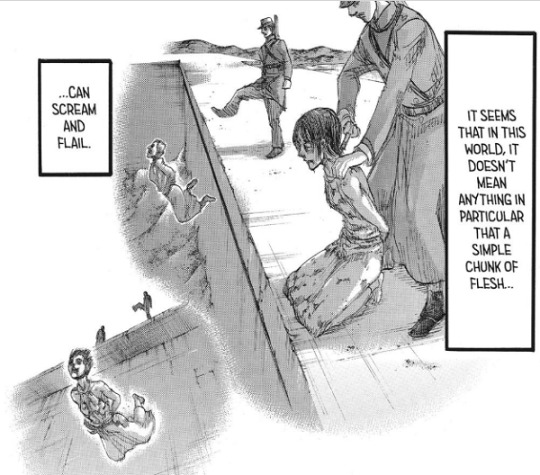
This part of the world, the one with hazardous deaths and merciless of titans / enemies, does represent the cruel side. The cruelty is to be found in the absurd and the chance, the fact that some survive (the case of Floch in particular after the attack carried out by Erwin) and others die, without there being no justification to give of it.

But what is the beautiful side of such a world, to which Mikasa’s referring when she’s thinking of Eren ?
Well, again it's quite sparse / interpretative (that's also why this post is a struggle to write), but this answer has a relation with the fact that narratively, the connection between eremika and the world is strong.
This is carried firstly by the place of main character of Eren and especially the fact that each of his actions has a major impact on the whole world currently but also because the relation eremika is surrounded by reflections, and by plot relevance around the world.
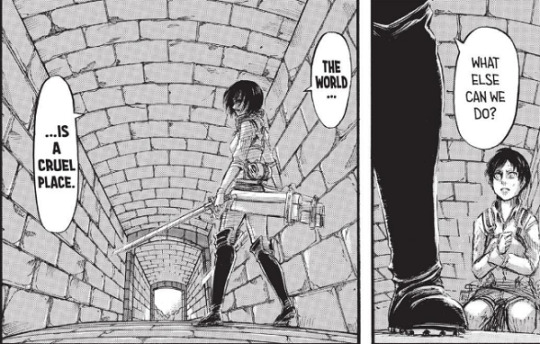
The reason I'm led to think that is the Eren and Mikasa’s moment at chapter 50 which may prefigure many things, and which are still accurate imo, especially with the coordinate. The first time Eren was able to activate coordinate was because of his desire to protect his loved ones, and especially at that moment, Mikasa. This is also highlighted by Eren’s memory who opens the chapter :

To go back on the said moment, it's interesting to observe a small detail in the animation, but which got its importance, that when Eren is feeling that his power doesn’t have any meaning since he still not able to save his parental figure (his mother, then Hannes) and realizes they're doomed, the brightness of the environment gradually decreases as if to suggest the world’s darkness, its cruelty in short.

Then Mikasa reminds him of the second facet of her maxim, through the memory of the scarf moment : “Thank you for being with me, for teaching me how to live, for wrapping this scarf around me.” It's also interesting to note that the perspective is essentially centered on Eren at that time, both on the side of the darkening world and the discussion with Mikasa since even the memory of the scarf that she evokes is drawn from his point of view:

Anyway, what I wanted to say is that this moment is especially important because of the embodiment of human natural sympathy it makes. Yes the world is cruel, there is non-sense and absurdity behind everything for which men struggle (Eren struggled to control a powerful force, to be worthy of representing humanity’s hope and it’s meaningless because Hannes still died and still they’re all doomed). But the natural sympathy that there is between men which is able to make a boy gives his home to a girl he doesn’t know for none other reason than this sympathy, is something beautiful and meaningful enough. So the beauty correspond at the meaning one can give to life, in the sense of a connection with humans and humanity itself. It’s the connection within humans as something warming
Like Mikasa’s maxim (”cruel but very beautiful”), though cruelty is present at first, the beauty of the world ends up prevailing over it since the environment after this memory, is illuminating again :
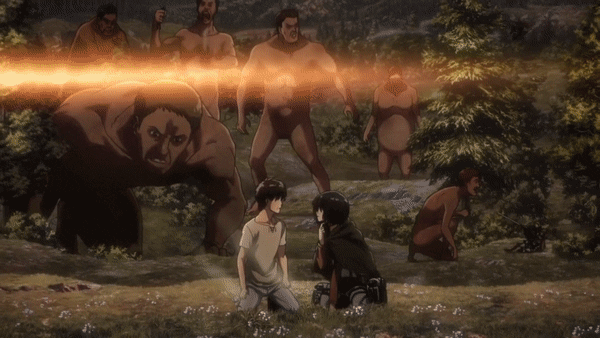
What makes this relationship universal is also that, narratively, the fact that Eren and Mikasa manage to share this moment literally saves everyone (Eren manages to engage the coordinate and they can all leave) (we can also notice in the animation above, that through this light increasing / decreasing we're going from a focus on eremika to a focus that illuminates the rest of the environment).
The theme of beauty also joins the theme of humanity in this sense. To resume on Arendt on which I had finished the last meta, the definition of humanity is the recognition in a community of living, that is to say the feeling of belonging trough this community, to the world, among similar persons. And in this imo, eremika represents all forms of love in SnK.
There was a meta about love as a lifeline a few months ago (but unfortunately I can’t find it again, if it recalls something to anyone don’t hesitate to tell it !), which was particularly accurate with this. Love, in its particular form, provides access to a universal form of love, and is the only way that can truly reverse the course of events and the cycle of hatred / enemy / resentment / war etc.
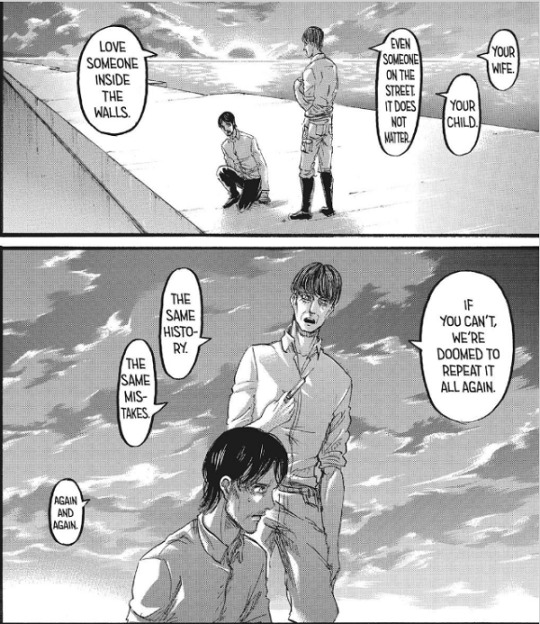
As a matter of fact, currently in manga’s action, things are at a reverse stage at this level. Mikasa and Eren have both given up the warmth of the scarf symbol and failed to communicate, coming up on a quiproquo (Eren believe Mikasa don’t see him more as a family debt, and Mikasa believe Eren had always hated her). And as a fact even though actions are supposed to go in the sense of saving loved ones, results aren’t very positive: chapter 50 -> everyone is saved ; chapter 124 -> the rest of the world in exchange of four people lives.


Well I’m not saying either eremika is a holy grail and at the very moment they’ll finally truly communicate on their love, entire world and SC and titans and Ymir will be saved, it would be way too sweet. But I do think a moment of exchange with their parallel (Mikasa and Falco especially) and the coming back of scarf moment may have an impact on the closure of the issue with world’s annihilation currently.
Well, this meta was pretty far-fetched and not very “limpid”, I probably wouldn’t have published if it wasn’t for the so kind people who asked it, so here it is ! I just hope it’s not too much disappointing compared to the delay you’ve wait for it ahah, and in any case, thank you very much for all the sweet words and encouragement ~
#shingeki no kyojin#snk#attack on titan#AoT#shingeki no kyojin meta#snk meta#attack on titan meta#aot meta#shingeki no kyojin analysis#SNK analysis#attack on titan analysis#AoT Analysis#eren#Eren Jaeger#eren yeager#Mikasa#Mikasa Ackerman#eremika
77 notes
·
View notes
Text
Us and the voice of dystopia
Jordan Peele’s latest film, Us, is as uncanny and disturbing as his first movie Get Out which proved itself to be a cinematic feat at the time of its release in 2017. Rightly considered as one of the fathers of the horror film renaissance (see also Ari Aster), Jordan Peele has been succeeding not only in addressing societal issues and in adopting a critical stance toward his home country but also in injecting an artistic vision in what is unfairly and generally regarded as second-class films.
In Us, Jordan Peele’s strong sense of composition and framing reveals the main theme of the film : the duality of human nature through the evil self. Nothing revolutionary so far. Many films of the genre have explored the mythology surrounding the figure of the doppelgänger from multiple angles. For example, Alfred Hitchcock’s and Darren Aronofsky’s use of the double has a psychological bent; to dig through Scotty’s perverse psyche in the haunting Vertigo (1958) and to explore a mental illness in Black Swan (2011), whereas in The Great Dictator (1940), Charlie Chaplin chose to play both Hynkel and the Jewish barber for satirical purpose. In Us, nothing of the sort. Remember what we said about Jordan Peele’s films? About how the horror genre disguises social subtexts? But before aiming at the true meaning of this human mirror, one should focus more on the narrative use of the voice which proves to be of utter importance to understand what is at stake, because if you really listen to the voice, you understand the whole film.
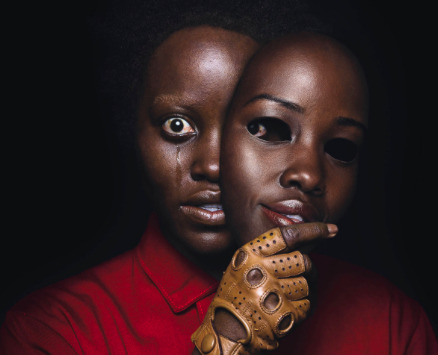
Us tells the story of Adelaïde Wilson’s family who goes on holiday at the seaside in Santa Cruz. A series of strange coincidences reminds her of the trauma she experienced there when she was a little girl while vacationing with her parents. She made a disturbing encounter in the hall of mirrors of a funhouse. She came face to face with a little girl who looked just like her. After this event, she could no longer speak for a while because of, it seems, a post-traumatic stress disorder. At present day, overwhelmed with fear, she confides in her husband about her past. The same evening, they discover four people standing outside their house, their doppelgängers. Ruthlessly hunted, the Wilson family will have to look inward in order to counter their own selves.
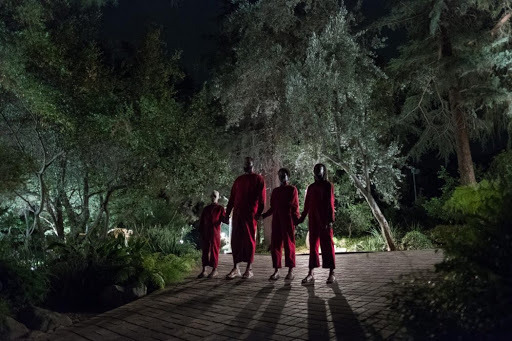
What strikes first when they all meet is that Red, Adelaïde’s double, is the only one who is able to speak, or rather utter words. She is struggling with very word she says, as if her speech production was failing her somehow. When she starts speaking, her voice happens to be hoarse, cavernous, husky, strained, even choked. Her disorder of phonation makes her voice otherworldly such as of a creature’s coming straight out of hell. It feels like she is not used to talk, actually that this is the first time she tries to pronounce and articulate words to create sentences. In this perspective, it is worth stressing Lupita Nyong’o’s astonishing work to produce Red’s chilling croaky and guttural voice. She used spasmodic dysphonia to make a creepy voice, that is a neurological disorder that causes involuntary breaks or interruptions in the voice due to an irregular flow of air. This language impairment, however, does not prevent Red from telling her story; the story of a dystopian world.
youtube
Red and Adelaïde are two sides of the same mirror. One learns that everything Adelaïde does is mirrored and has an impact on Red’s life, only the other way around. Everything that is happening in Red’s life is a pale copy of Adelaïde’s achievements and takes on a nightmarish dimension. Red’s husband, Abraham, is rough and dumb; her daughter, Umbrae, is born laughing and her son, Pluto, is a dangerous arsonist. The ideal family meets the poor and sad version of themselves who now claims justice through revenge, hence the imagery of the good and evil self.
Throughout the film, the mise-en-scène keeps referring to the double as a warning or rather a prophecy as to the coming of those doppelgängers clad in red jumpsuits, which strangely resemble the clothing of prisoners. The clues left by the director are the following ones : the twin sisters of the superficial WASP family friends, the shadow of each member of the Wilson family projected on the sand while they are walking on the beach, the recurring number « 11:11 » featured here and there (an extract from the Bible, Jeremiah 11:11), Jason wearing a mask (maybe a reference to the iconic masked murderer of Friday the 13th whose name is Jason?), Jason’s drawing showing a kid who looks just like him, a toy plastic spider behind which a true spider appears crawling across the low table of the living room, and of course the daze of mirrors.
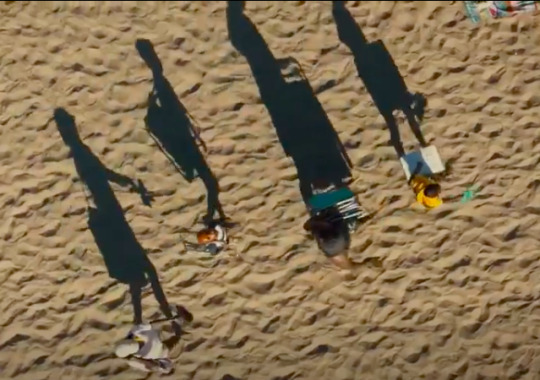
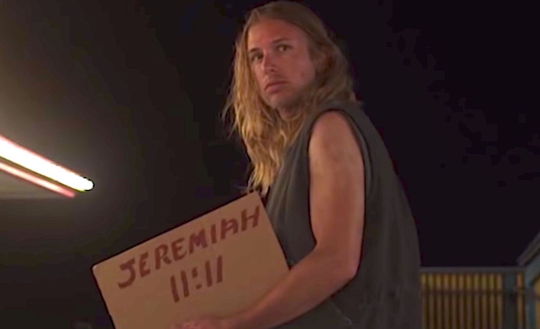
All those elements evoke duplicity and foresee a parallel world unknown so far. Red’s voice, alone, embraces all that imagery and embodies the punitive prophecy hidden behind the verse from the Old Testament book, the Book of Jeremiah, whose verse alludes to God’s wrath : « Therefore thus saith the Lord, Behold, I will bring evil upon them, which they shall not be able to escape; and though they shall cry unto me, I will not hearken unto them. » The invasion of the doppelgängers across the world is a divine plague orchestrated by Red from the underworld to take revenge.
In fact, what the film tends to reveal all along is the existence of an underworld located inside « the thousands miles of tunnels beneath the continental United States », which are « abandoned subways systems », as stated at the very beginning of the film as an introduction. Those subways are inhabited by people who are the product of a failed governmental scientific experiment designed to replicate the bodies of those above to manipulate them. However, they discovered that the « soul » could not be duplicated, hence the repudiation and neglect of that population now doomed to survive below the Earth’s surface, with raw rabbits as sole source of nourishment, and to « act out grim recreations of their respective partners’ above ground actions like sad little marionettes. »1 The scientific dimension of this governmental conspiracy is foretold in the opening credits by the camera progressively zooming out the caged rabbits. This shot conveys the idea of a sanitized laboratory. The existence of two opposite worlds is also mentioned by the shot which shows the funhouse twice, by night and day (darkness and daylight).
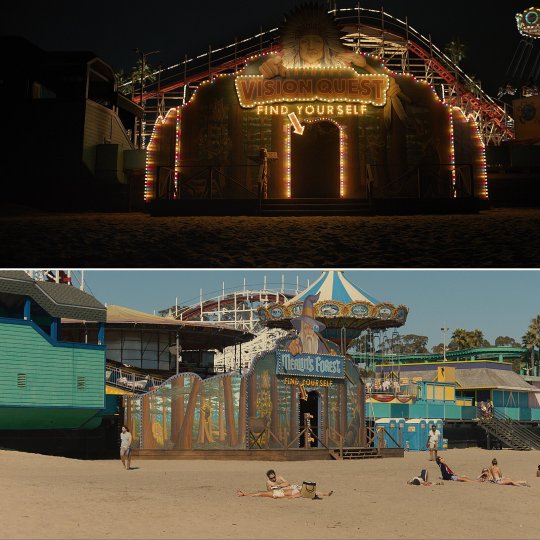
The organised overthrow, which takes as an example the Hand Across America charity campaign of 1986 (giant human chain), can be interpreted in many ways : an uprising against social inequalities, such as racial, gender and salary based discrimination, which undermine the U.S (or Us); a country where climbing in the social ladder is more and more unattainable for under-represented ethnic minorities. It can also be seen as a denunciation of what America has become, unfair, poor and divided; a denunciation of the famous ideology of American exceptionalism through the ostentatious display of American symbols distorted by the horror genre. The « tethered » are done being downtrodden and ostracized. They want to embrace the American myth that had been promised to them by taking their rights back and by building a new world, hence Red’s assertive reply to Gabe’s question « Who are you, people? » : « We are Americans. » They claim themselves as being true Americans (to be connected to the Native American reference of the original funhouse’s sign), free from all materialistic concerns.
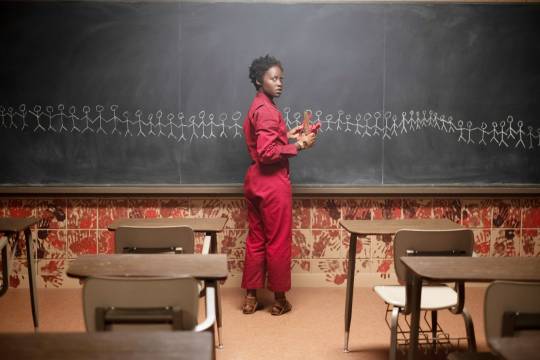
Only, this does not constitute the twist ending of the film. Like all self-respecting horror films, Us is no exception in the matter and does offer a shocking one. And this is the voice which hints at it all along and that turns upside down the government’s theory about their human experiments.
Red’s whistling while walking up the alley of the Wilson’s family with a pair of scissors in her hand in the dark is where the truth really lies. If one has well paid attention to the details, one would have noticed that Adelaïde whistled the same way when she was trapped in the hall of mirrors when she was a young girl, as if to ward off the coming threat. Do you see my point? Why is Adelaïde so reluctant and does have trouble engaging in a conversation with Kitty on the beach? Why would Red be the only tethered to be provided with the ability to speak? Why this eager for revenge? Because Red actually is the true Adelaïde. Back to the funhouse in 1986, young Adelaïde’s clone, Red, was lured to go to the surface as Adelaïde progressively approached to her tragic destiny.
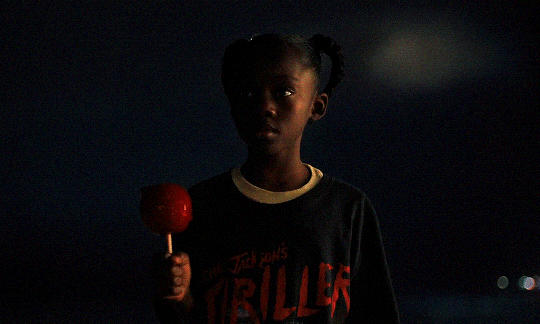
What the film did not show is that Red strangled Adelaïde until she fainted, dragged her down the tunnel, attached her to her bed in the dormitory and switched place with her among Adelaïde’s family, hence her early language deficiency. While Red grew up like a normal little girl and learned how to speak, Adelaïde lost progressively her language abilities growing up among zombie-like human beings, which proves that the government’s theory is wrong. The soul cannot be duplicated but this does not mean that the tethered are « soulless creatures ». If given the chance, as Red has had, the tethered would have turned out perfectly okay. They would have followed the regular human evolution process called « hominisation » or « anthropogenesis », the process of becoming human. Indeed, the doppelgängers all look like primitive animals. Pluto, by his gesture, reminds of a monkey-like primate’s attitude and Abraham’s moans, groans and grunts are those of Cro-Magnon man. Their names evoke ancient times, something rough yet to evolve, and the mythology of the doppelgänger, Pluto being the god of the underworld, Umbrae the latin word for shadow. Abraham is the « Father of the nations » which can be connected to the human chain the tethered seek to initiate to rise up and find they own humanity. Red’s name could refer to the color of the tethered’ garments, and thus evoke the state of imprisonment which they have been reduced to until now.
In this perspective, Red’s voice is not only the voice of dystopia but goes far beyond this sole and somewhat manichean opposition which is the driving force behind the narrative of the film. Red’s voice, by also being the voice of anthropological evolution, mainly serves to establish a connection between the latter subject and the current state of American society. With no equality of opportunity, people cannot equally seek higher social and intellectual status and end up being the slaves of the system. America has now no other choice but to drop her delusions and take her mask off.
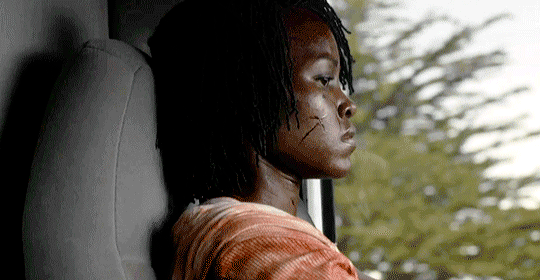
1 Bojalad, A., (2019, March 22). Us, Hands Across America, and the failed American experiment. Retrieved from https://www.denofgeek.com/movies/us-jordan-peele-hands-across-america/
#us#jordan peele#red#umbrae#abraham#pluto#lupita nyong'o#horrorfilm#doppleganger#evil self#the tethered#get out#dystopia#elisabeth moss#winston duke#shahadi wright joseph#evan alex#handsacrossamerica#scissors#double#clones#funhouse#hall of mirrors#rabbit#spasmodic dysphonia#voice#jeremiah 11:11#croaky#hoarse#american exceptionalism
2 notes
·
View notes
Text
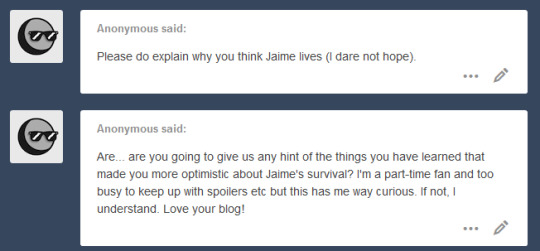
Okay this is going to be long haha. As a disclaimer, Jaime can still die. This just explains why I’ve become skeptical over that fate.
I have not been given a straight answer to Jaime’s fate by any of the people I have spoken with, and I can’t be too detailed in my explanations because of reasons, but this is what I can say:
1. Jaime doesn’t die in the battle of WF. I’m making this clear because this has become popular spec. Now when I say die, I mean permanently dead, not resurrection dead. I have no info about any resurrections, so it’s entirely possible he can “die” and still come back. All I know is that Jaime is definitely alive after the battle of WF, so don’t listen to any leaker who says his final farewell is during that battle. I know of a specific event (actually, two of them) that happens after the WF battle, and he’s very much alive for it.
2. Jaime is in all 6 episodes, and no, that information is NOT taken from Nikolaj’s contract. I can say this with 99% confidence.It’s possible he could be in less depending on how they move scenes around in post production, but at least during filming, every person I spoke with was certain he was in every episode.
3. Jaime is not dead during Tyrion’s trial in episode 6. Tyrion’s trial is AFTER the KL battle.......... sooooo.................
4. Okay this really isn’t anything lol but, they were all pretty excited to tell me what happens, and wanting to tell me “so badly!” while… knowing I want him to live. Like I said, that doesn’t mean much, but I’m giving them the benefit of the doubt and assuming they’re not, like, Satan or something. “Omg you want him to live so I’m so excited for you to see him DIE! :D!!”
Recent Observations:
This isn’t what I’ve been personally told, but this is what I have observed in fandom over the past few months. Take all of this with a grain of salt. I’m only including these because they got my attention, considering what I know.
1. There have been a couple randos that have popped into fandom just to say that everyone is wrong about Jaime because he lives and then they poof. Like I said, take this with a grain of a salt. It probably is nothing, but they always stood out to me as suspicious.
2. Recently, someone said they spoke with a family friend and that friend said a person everyone thought would live ends up dying and someone who was “seemingly marked by death from the beginning” would survive. This actually can’t really be argued for any character. Not every character has been around since the beginning, and only a handful have been “marked by death” in the eyes of fandom.
Speaking on average: Jon, Dany, Sansa, Arya, Bran, Sam… all of them have fairly uncertain fates or the assumption of survival. Minor characters? No one is going to care so much about their fate to give a spoiler about it (“oh man dude! Melisandre LIVES! People will freak!”) or the others haven’t been around since the beginning… IMO, there are only two characters that fit that description: the twins. Considering I have good reason to believe Jaime may actually have a chance at survival, and since literally every sector of the GoT fandom, including the JB fandom, he's talked about as if he’s already dead, I’m going to make an assumption here and apply that to Jaime. Out of the twins, Jaime has actual potential set up for survival, Cersei not so much.
Narrative:
As much as Jaime’s death would fit the traditional mold for the path he is currently on, there is setup for a possible survival in the books and the show. I had always envisioned his fate going either way, and was confused why people would be completely convinced of death or survival. I felt both had set up? I went from thinking he was doomed, to thinking he would survive, to being totally unsure, back to thinking he’s dead again, and now I’m residing in survival camp.... for now, at least lol.
I could go on and on and on with the support in the books. I could describe a different interpretation to his weirwood dream, dig up quotes about how he’s yearning for fatherhood and a married life and how he thinks he will only ever be a warrior, explain how the hand chop was his “death,” moan about how eye-roll worthy it is for him to be a Stark prop. I can find evidence to argue that he’s simultaneously being molded into a leader and heir and therefore it would be a wasteful death that accomplish nothing. I can also blab about how Brienne is basically his plot armor because of how ridiculously redundant and meaningless it would be for HER arc if another person were to die in her arms and leave her exactly where she started (actually, no, I’ll probably still talk about this with the show evidence because it annoys me). But since this is a somewhat show-themed post, the question being about season 8, I’ll just stick with the show evidence.
Show Evidence:
1. Watch: Jaime and Tywin’s conversation #1 , conversation #2, conversation #3. Look. The show decided to include THREE SCENES about marriage and the Lannister Legacy. THREE................
“Oh but in the first one he says that he doesn’t want the Lannister legacy to fall like the Targaryens did which foreshadows the Lannisters going extinct.”
Jaime fulfilling his duty as heir has been brought up T H R E E times.
And the Targaryens went… extinct? … I mean… who are the two leads of this series? If they’re going to parallel the Targaryens in some form, then that means they definitely don’t go extinct. Baby Lannister left behind? Possible. But…
2. Jaime is removed from the KG in season 6. Why? In the show he... didn’t need to be removed from KG so he could later on leave Cersei (even in the books he ran off while still on the KG). Brienne says Fuck Loyalty and he Fucks Loyalty anyway. They could have had him do that while still member of the KG. It was perfect setup. Tywin wants him removed so he can fulfill the Lannister legacy, Jaime eventually gets removed. What’s the point of removing him from the KG to simply lead the Lannister army for two seasons and then die if he could have been doing that anyway as LC? They removed him from the KG because he’s being molded into an heir and freed of vows for endgame. And, again, connects to the Tywin conversations.
3. Purple Wedding. Ah, one of my favorites. (<- that one kinda sucks because the youtuber edited Brienne’s walk to be more quick but you still get the point)
When Loras and Jaime are having a conversation, Jaime says, “You’ll never marry [Cersei]” and Loras responds with, “And neither will you.” Loras walks away, Jaime looks down, Brienne walks past and Jaime looks up. Keep in mind GRRM at least wrote the Cersei and Brienne portion, and it was even mentioned that they paid attention to the transitions. when filming and editing.
Minor detail to mention: the Bear and the Maiden Fair is playing in the background.
”lol that song has been used before for other people.”
Yeah... for marriages. Not only has it been consistently used for Jaime and Brienne - also season 3 when they’re captured and used as the episosde title for the bear pit- but the other times it has been used were for: the wedding feast between Tyrion and Sansa, the wedding feast between Edmure and Roslin, and then the wedding of Joffrey and Marg... and when did it play at theirs? During the Jaime and Brienne scenes, literally during and after Loras told Jaime he would never marry Cersei and then Brienne walks past and then Cersei accuses Brienne of being in love with Jaime.
“It just means Jaime won’t marry Cersei because he’ll fall in love with Brienne.”
Maybe? But he’s already simultaneously falling in love with Brienne and he was (in the show) still trying to marry Cersei? Why is a theme of marriage hammered in so often then? (like Brienne’s monologue, which I’ll get to)
Maybe I can also throw in this more tinfoily bit in. “Maybe you’re a Lannister too.”
4. “Die in the arms of the woman I love.” -sigh-. Okay, I admit, the first time I heard this I jumped on the SEE JAIME IS DEAD bandwagon and was firmly stationed on that wagon until I got info that started raising my hopes and then Brienne’s, “nothing’s more hateful than failing to protect the one you love” popped into my head and I’m like

and then “who wants to die defending a Lannister.” Yeah yeah, “who wants to die defending a Lannister” is simply foreshadowing Brienne’s love for Jaime and doesn’t necessarily mean she will die (she at least survives to episode 6, after the battle). But if you take that and mix it with “nothing’s more hateful than failing to protect the one you love” and stir it in a pot, you got yourself Brienne making a move that almost gets her killed to save Jaime and NOT fail the like 4th or 5th person just because.
That line about failing is so often overlooked. Yeah, of course it’s possible it can mean she fails again, but I’m just… even if it doesn’t foreshadow shit, it made it clear that failing the one she loves is a thing she wants to avoid so... why the hell would the story have her fail another fucking person? What’s the point? She feels like she failed her father, failed Renly, failed Catelyn (more in the books), she’ll probably feel that way after Pod bites it, let’s have her fail Jaime too! :D! Let’s also be repetitive and have a guy die in her arms again just to rip her heart out and leave her exactly where she started just for the demonic lolz (btw I never subscribed to GRRM being as blood thirsty as people make him out to be). To me, that line sounds like she’s going to do everything in her power to not let that happen ever again. There will probably be a close call where she thinks she failed but doesn’t. Jaime saved her twice, maybe she will be the knight in shining armor and save him.
“Okay but what if she’s left with his baby? She’s not exactly where she left off then.”
No, she’s not in the exact same spot, and that’s a scenario I definitely find plausible. However, she... still kinda is? Stripping her of the only person who has ever genuinely loved her in that way sends a message that society is correct- Brienne, an ugly, undesirable woman- is unworthy of love. Brienne is unworthy of a long, happy life full of love because the Gods gave him to her for just a bit, dropped a baby in her lap as a consolation prize, and took the one person who has ever genuinely loved her for who she was.Normally I would argue that GRRM isn’t writing a story that gives characters everything they deserve. And I agree with that, but I’d argue that he’s using Brienne to literally tell a message of BatB. Inner beauty triumphs, superficiality does not (Cersei being example A). The message isn’t as effective if this rejected, freakish, beast of a woman continues to feel like a failure, continues to get fucked over and remains fucked over in endgame.
Now back to “die in the arms of the woman I love.” This line was used to set up the JC downfall to the viewers, and get Jaime questioning by having Bronn say, “does she feel the same?” On the surface it’s Cersei, the subtext is Brienne. That was it’s purpose. But I tend to agree with the people who say it can also be foreshadowing. So can he still die? OF COURSE! Will I agree with the narrative decision? NO (explanation further down). Can he die and be resurrected like a literal BatB tale? YEAH! Can it mean that he dies in the arms of the woman he loves as an old man? SURE! There’s multiple interpretations here.
Going back to the last one, I find it curious that immediately before Jaime mentions his preferred way of death, Bronn said he wanted to die as an old man in his castle with children groveling at his feet for his fortune and Jaime makes a comment about how that’s boring. So, I’d find it kinda funny then if the two desires were combined. (and Jaime never said in a battle, btw. The scene he describes is romantic with no context).
5. Brienne. Don’t tOUCH ME. Okay.
a) She told Catelyn she wasn’t a Lady, told Pod she wasn’t, Cersei told her she’s a Lady whether she wants to be or not... her insecurities over being a Lady is CLEARLY a theme that the show decided to keep. And then there’s this scene. Brienne fulfills her oath by keeping the Stark girls safe and getting them North. Pod calls her my Lady, Brienne begins to say she’s not a Lady, stops herself, and then thanks Pod. why is this always ignored?? This is saying that plot is done. Brienne is done being a bodyguard (which is also made crystal clear in Season 7 when Sansa basically tells her she can protect herself and Brienne tells the Hound that Arya doesn’t need protection). Brienne’s acceptance of her title is the story saying that Brienne will move on from this dragged out af plot and will now get ready to fulfill her role as Lady/heir. So what does this have to do with Jaime? Ahem. Well who else is being groomed for the role of Lord/heir?
b) I’ve been dying for them to finally give some book canon backstory to Brienne and show her vulnerable side. I was pleased in season 5 when we were delivered a wonderful little nugget that isn’t straight book canon, but an adaptation of it. Look, the fact that they even CARED to adapt this for the show is huge. Here is the scene.
The addition of this scene is important because it’s Brienne literally telling Pod (and the viewers) that the happiest she has ever been was when all the boys wanted to marry her and take her back to their castles. It’s reminding the viewers that romance is a major theme of her arc. They had her specifically mention marriage and living a domestic life in a castle and that made her fucking happy dude. The happiest she had ever been.
Now… why? Why is that necessary if Jaime and Brienne are just destined to bang and then he bites it? If they wanted to highlight that Brienne is a sexual being that wants to be loved, they literally could have taken out the whole marriage and castles and kept it as the boys dancing with her and complimenting her and flirting with her made her happy. But no, they brought in marriage. She wants marriage, man. She secretly desires the life of a Lady, with the one she loves, and that’s okay. And do NOT tell me that her destiny is to be some bodyguard for the Starks. I already wrote like 4 paragraphs on it but deleted because… not the place. Anyway, they adapted the marriage bits because it’s something that comes up in Brienne’s chapters quite a bit. (The lions on the cloak as she watched the boy she was to marry walk away and Jaime putting a cloak around her shoulders are probably my favorites).
“But what if they marry and then he dies!”
Oh, a little spoiler: Let’s just say it doesn’t seem likely they marry on screen. Possible, but very unlikely. So if they marry, marriage would have to be implied after the show... -whispers- which means he would have to survive.
Also, I already explained why I personally find that an ineffective ending, but again, is it possible that’s the version being told? Hell yeah it is. This is why I’m not completely convinced of his survival, and why I have always been open-minded about his death, and have gone back and forth depending on how much I trust the quality of writing. In most redemption arc narratives the character dies because death itself is something they have avoided, usually by obtaining power or through an exploration of a courage theme. Jaime has already proven he’s willing to sacrifice himself and has accepted his death on many different occasions (ex: he jumped into a bear pit with one hand and no weapon with literally no plan, and on the show he charged a fire breathing dragon head on with nothing but a spear I mean....), so what does his death as a knight really accomplish for his character besides, “it’s TRADITIONAL! Redemption = only DEATH! Knightly honor = only DEATH!” (I can feel myself going down a rabbit hole by wanting to talk about the hand chop so I’m going to stfu now because this is getting ridiculously long.)
“GoT has been inconsistent in the past and sometimes they do things that make no sense.”
I know, and it’s still entirely possible the execution of this story is trash and everything was pointless. That argument could apply to literally everything I say in this post. But at the same time, GoT is shit at being subtle, and when they want to drive a point or theme home, they do, even if it’s sloppy. (and yeah, like mentioned, I see this in the books as well... I’m not basing my opinion entirely on the show. It’s just if I add book bits on here, it’s going to get even more boring than it currently is lol.)
“Gin, sorry, I just disagree with you.”
That’s okay! It’s possible I end up changing my mind 50 more times, based off of the info coming in. Guys, I just think this story can be DIFFERENT. I’m so goddamn tired of the same, predictable narratives. And also because, like I said, I see potential set up for survival. I see all of the different interpretations. I’m tired of seeing people act all arrogant, like the answer is already there, when I see evidence for at least the possibility of something different.
Like we can’t even fucking discuss his survival in fandom, and if someone even BREATHES it they’re called delusional or in denial, even by their fellow JB shippers. NO? I just see multiple paths and interpretations?? And... to make it even more confusing I’ve been receiving optimistic hints that have raised my hopes??????? Fuck, I’m basically a victim here because I had been comfortable assuming the worst lol.
I’m legit procrastinating on posting this because I have anxiety putting it out there. Discussion of his survival is that unpopular.
#jaime x brienne#brienne of tarth#I totally just talked to myself throughout the entire post#and#I warned you it would be long haha#..#.#got spoilers#got s8 spoilers#jaime lannister
191 notes
·
View notes
Text
I’m gonna lump 14.04 and 14.05 together here for the sake of simplicity, since they both look at one particular facet of the things I discussed in my last post about 14.03: Fathers.
https://mittensmorgul.tumblr.com/post/185016627975/aah-1403-power-doesnt-fix-anything-dean-is
At the time 14.04 aired, we all SQUEALED at the direct parallel between Hatchet Man and John Winchester, and Dean’s admiration of the character despite actively recognizing him as a bad guy doomed to lose. It’s a complicated tangle of feelings that are (using the metaphor I started in the post linked above) symptoms of the underlying issues Dean has with John Winchester and how he was raised, what John forced him to become.
The early part of the season is positively crammed with foreshadowing that Dean will eventually get to confront the actual SOURCE of these symptoms, facing John himself and effectively not forgiving him, but as he tells Sasha in 14.05:
Dean: Can I give you a little advice? Let it go. The past is... There's nothing you can do about it now, so it's just baggage. Let it go. You'll feel a lot lighter.
Sasha: Is that what you do?
Dean: I try. Every single day.
because in 14.13 Dean gets to face John directly:
Dean: You saying you wish things would be different?
Sam: Don't you? Can you imagine -- Dad in the past, knowing then what he knows now? I... I think it would be nice.
Dean: Yeah. I used to think that, too. But, uh... I mean, look, we've been through some tough times. There's no denying that. And for the longest time, I blamed Dad. I mean, hell, I blamed Mom, too, you know? I was angry. But say we could send Dad back knowing everything. Why stop there? Why not send him even further back and let some other poor sons of bitches save the world? But here's the problem. Who does that make us? Would we be better off? Well, maybe. But I got to be honest -- I don't know who that Dean Winchester is. And I'm good with who I am. I'm good with who you are. 'Cause our lives -- they're ours. And maybe I'm just too damn old to want to change that.
This theme is pretty directly addressed in 14.04, but in 14.05, we begin to see it in a Bigger Picture sort of way that connects it directly to the overarching narrative themes of Chuck’s manipulation of the story revealed in 14.20.
We’ve discussed for eons how Sam and Dean have slowly been dropping the curtain on what they do when dealing with people directly involved in the cases they work. This goes back to s11, at the very least, this causal stating of facts about the horrors people are experiencing. In 11.13:
Dean: I don’t know. I mean it’s not like this thing is exactly following a pattern. I don’t even know what I’m looking for here. We cut out of there pretty quick though so maybe I bought us some time.
Melissa: What was that?
Dean: We think it was something called a shapeshifter, but it can’t be because I pumped the thing full of silver and it didn’t even flinch.
Melissa: What kind of FBI agents are you?
Dean: The fake kind.
Sam: We’re hunters
Melissa: Hunters?
Dean: Look all you need to know is we save people like you from things like that.
They don’t exactly go out looking to the truth of what’s really out there to random people, but once people are exposed to the weird stuff, they’ve long ago stopped trying to explain it away. Once someone’s seen the truth, they’ve been providing helpful facts. I mean, recall Dean’s conversation with the Sheriff in 13.01 for the absolute most nihilistic version of this little chat.
And that’s what Dean does with Sasha in this episode.
But it’s Dean’s entire interaction with the djinn that becomes a microcosm on at least three levels of Chuck’s overarching power over all of them.
Take what we now know to be true of Chuck: that his need to retell his story over and over again trumps everything. Look at what this story involved, and zoom it all out to Chuck-level narrative:
A djinn-- a being capable of creating altered states of reality in his victims which he then “feeds” off of, sustaining himself through forcing people to live out the “stories” he implants in them. Just like Chuck altering their lives in subtle ways for his own sustenance.
But this djinn? Has had to “enhance” his powers through Michael’s grace in order to affect the story, to level the entire thing up. He went from keeping his victim’s in a comatose state only able to live out his fantasy worlds inside their own minds, to bringing those fantasies out into the world in three dimensions. Much the way Chuck was eventually compelled to insert himself into his own story again to level the whole thing up.
Michael, in both cases, was merely the narrative mechanism, the expositional character through which all of this was slowly revealed to us.
The djinn itself was only ever a symptom of this interference, just as his visions were only ever a symptom of his interference in the lives of his victims. Once they saw the truth, the whole illusion literally crumbled to dust.
And Dean has to begin to separate himself out from the trap of believing his own responsibility in any of this:
Dean: I know, I know. Not my fault. It's Michael. It's all Michael. You know, I've been trying to -- not forget, but to move on from what I -- from what we -- from what he did. And I got to be honest, I was starting to feel like myself again. Almost.
Sam: So we'll work harder.
Dean: How, Sam? You get three hours of sleep a night.
Sam: All right, then I'll sleep two. Dean, we're going to find Michael, and when we do, we will kill him.
Dean: How?
Sam: I don't know. We'll -- We'll -- We'll track down Dark Kaia and her spear. We'll -- We'll find something.
And of course back in 14.05 he’s still unwittingly trapped in this level of the narrative, hasn’t been able to free himself from Michael completely yet. Hasn’t been able to completely free himself from that baggage he so desperately wants to put down Just as he hasn’t been able to free himself from Chuck’s Bigger Picture Version of this exact same narrative until 14.20.
To me this becomes fascinating when Michael retakes his vessel in 14.09, crushing Dean’s hope that Michael really had just “left” him. Because Chuck hadn’t really just “left” after 11.23, either. He was still actively involved in manipulating Dean’s life (all of their lives, really, but 14.05 tells this directly through the lens of Dean’s personal experience).
Dean must again overcome this control, but instead of being allowed to lay that baggage to rest, he locks it away in 14.10 with the help of Sam and Cas (a Chuck Move™ if ever I saw one-- if it’s a problem, lock it up and throw away the key). No matter how hard any of them fight against the narrative, against the monsters that have been “supercharged” by Michael’s interference, they’re still only battling the sorts of dust monsters the djinn sent after them in 14.05. It’s all a cosmic runaround designed to keep them living out this story over and over again. It’s only recognizing the actual source of the “curse,” the actual source of the power sucking the life out of their lives, that they’re actually able to see all of this for what it was.
Through each successive confrontation with this exact same theme on every level of the narrative, TFW becomes both more entrenched in fulfilling Chuck’s narrative wishes but also more savvy to how exactly they’re being used.
Heck, s14 is narratively perfect. It kicks s4′s ass, and effectively consumes s11 ouroboros-style.
#spn 14.04#spn 14.05#spn 14.20#it's spirals all the way down#if you say 'mysterious ways' so help me i will kick your ass#spiders georg of the tnt loop#s14 hellatus rewatch#dabb vs cars#spn 14.09#spn 14.10#spn 11.23#spn 14.13#spn 13.01#spn 11.13
15 notes
·
View notes
Text
The City of the Old Emperors: Thoughts on Openbound
DJay’s post reminded me that I have a lot of vague thoughts about Openbound, which I’ve never managed to organize into a coherent essay. In part, I was waiting for DJay to share his idea of Openbound as a kind of katabasis (journey to the underworld), which is central to a lot of my thinking these days. Now that that idea’s arrived, let me talk about some of my own.
Spoilers, as with all the best Homestuck analysis, for the book version of The Neverending Story.
1.
So. I’m very much in agreement with DJay’s big thesis that the shallow, annoying personas the Dancestors hide in are a ruse - a distaction, if you will. The dancestors present themselves as annoying, one-note characters, but they actually have a lot of history and pretty complex psychology if you look a little further - it’s just that at *this* point, after a billion years of living out their memories they’ve retreated into simplistic roles that they can safely play without engaging any more deeply with their past. Terezi and Karkat even acknowledge this, calling them caricatures. I love DJay’s term - “shades.”
I think where this really clicked for me was in in-story Hussie’s comment on Latula. He claims there’s nothing more to her other than being a cool rad gamegrl radgirl coolgirl.
This is obvious bullshit. Talking to her as Porrim reveals that Latula puts on the gamegirl persona as a way of dealing with other people, and she’s actually kind of relieved to be able to drop the act and acknowledge her problems. Relatedly, talking to Kankri as her reveals that she’s dealing with the problem of him awkardly hitting on her, which is one reason she retreats into a Gamegrl persona around him.
This is true for basically all of the characters introduced in Openbound. In-story, Kurloz is dismissed as a ridiculous mime when he’s helping Gamzee orchestrate LE’s rise and suppressing the agency of his friends (oh hey, Gamzee does this too, putting on the persona of “lolrandom incomprehensible prankster”); Cronus is indeed terrible, but terrible in a “what could have been kind of way” where he once had the chance to be a Harry Potter-esque hero; Mituna babbles and insults but only because he burnt his brain out making a great heroic sacrifice, Damara distracts the pretty significant statements she’s making about LE with vulgarity, Rufioh is pretty insecure beneath being Rufioh ...the list goes on.
So Hussie, in his in-story persona, is a god damn liar, and this is key to everything to that comes next.
The funny thing is, you don’t get the real stories from Hussie. You get it from talking to Aranea, which is framed as an act of “indulging” her, and by extension the author...but it’s only this “background” information which gives these characters complex lives and motivations beyond their personas. The effect it has is not of indulgence - the effect is to frame the whole dancestor ballet as a non-indulgence, revealing them as deeper than they seem.
(At this point, though, many readers will already be sick of them, and miss what’s really going on.)
Porrim would seem to be the one exception. In her case, though, I think it’s not so much that the reader doesn’t recognize her complexity as a person, but that her friends don’t. They stereotype her as being all about sex and relationship when her sex positivity is actually part of a larger goal of honestly examining her society. She’s the only one who can see the personas for what they are, since she recognizes it as something put on her from the outside.
2.
The theme of a voyage to the underworld (katabasis) can be analyzed a number of different ways, and all of them fit Homestuck. As an epic, Homestuck of course has an obligation to go to the land of the dead halfway through its story, so that the protagonist can learn something they need to know.
If there’s anything we’re learning these days, though, the protagonist of the epic Homestuck isn’t a character, it’s the MSPA reader. It’s us who make the journey to Homestuck’s underworld. Meenah plays the role of hero there, with Aranea her guide, but we know that we move through which characters we control, each of them being temporary analogues for our will. We are the ones who descend into its hell.
(And now I think we’re finally figuring out what we’re supposed to learn there.)
Just as DJay says, the fact that these characters are reduced to stereotyped shades is all Lord English’s fault. Literally, they’ve been hollowed-out by millions of years of being trapped in their memories, thanks to his machinations ruining their lives, and now face his threat again in the afterlife. Metafictionally, we’ve been asked *not* to care about them by the narrative, in the same way Caliborn demands that we don’t give a shit about Homestuck. That’s LE’s great power over the narrative: the threat of apathy.
3.
I tend to think of Life, in Homestuck’s platonic-narrative symbolic system, as representing positive character growth, and by extension things that readers experience as positive development. It’s interesting, then, that the one who brings these dead souls back to life is Meenah, a Life player. It’s even more interesting in that it’s Meenah who deprived them of their lives in the first place. Thinking to escape a dead session for the afterlife, the Thief of Life robbed them of their literal lives, but she also robbed them of their chance to grow as a people. They are thus echoes and victims of LE’s nature as a being that cannot grow or change, and is doomed because of it. But also, it’s kind of Meenah’s fault. Her frustration with them echoes her own choices.
(Worth noting, though, that Tavros is able to persuade them to take part in the final fight against him! It’s subtle, but a little burst of Life at the last moment.)
4.
Openbound is full of good parallels to katabasis mythology. The dream-bubble afterlife echoes both Greek Hades and Christian hell. Homestuck’s dancestors are a lot like the shades Odysseus and Aeneas encounter: they’re faded ghosts, “shades,” who can’t speak until the hero gives them blood to restore their intelligence for a brief time. In Homestuck, what we - and Meenah - give them is a brief window of attention. But it won’t last, and it won’t restore them to life. But it’s also Dante’s Hell. Dante sees souls undergoing ironic punishments, trapped by their own greed, avarice, and lust. The limitation of their will is what keeps them in hell.
There’s one more descent story which I think is very instructive here, though.
And that would be the City of the Old Emperors from Michael Ende’s The Neverending Story, a tale which has quite a bit of relevance for Homestuck.
5.
The first half of The Neverending Story featured the protagonist Bastian being called into the pages of the book and the world of Fantastica, explicitly stated to be a realm made of humanity’s ideas, to recreate this world anew. In the second half of the book, he does so. Unfortunately, as he becomes more sure of his world-creating power, Bastian loses the memory of his own humanity, and begins to forget that Fantastica is not merely his plaything. Declaring himself Emperor, he tries to pretend he created it all, when really he was only acting through the power of another, The Childlike Empress. Bastian soon undergoes a spectacular fall at the hands of his previous allies and friends.Only then can he wake from his reverie and find the last wish he needs to achieve redemption.
But for that redemption to happen, he needs to go into a kind of underworld himself, to learn what mistake it was that he was making.
After being defeated by his friends, Bastian stumbles into a strange city. His horse disappears under him, and he falls - down, down into a crater, where there is a city of strange buildings, full of people in strange clothes doing bizarre things. Before long, he finds a monkey-like guide named Argax, who calls the place the City of the Old Emperors. These strange figures, Argax informs him, were all people from the human world who declared themselves Emperors as Bastian did, and this is the sad result.
“How did they get here? What are they doing here?”
“Oh, there have always been humans who couldn’t find their way back to their world,” Argax explained. “First they didn’t want to, and now, in a manner of speaking, they can’t.[...]”
“Why can’t they?” he asked.
“They’d have to wish it. And they’ve stopped wishing. They used up their last wish for something else.”
“Their last wish?” said Bastian, going deathly pale. “Can’t a person go on wishing as long as he pleases?”
“[...]No! No!” he chattered. “You can only wish as long as you remember your world. These people here used up all their memories. Without a past you can’t have a future. That’s why they don’t get older. Just look at them. Would you believe that some of them have been here a thousand years and more? But they stay just as they are. Nothing can change for them, because they themselves can’t change anymore.”
- The Neverending Story, Chapter 23, pg 378-379
Bastian learns that all these people used up their wishes, leaving them unable to understand or interact with the world. Imagination eludes them - they can only tell stories by randomly forming words from jumbles of letters. Because they didn’t understand where their wishes were coming from, they were left without the capacity for wishes altogether
Another way of saying this is that they were left without will. They have no will to impact the world, because they turned away from the world altogether, retreating into a false idea of themselves. A persona, and not a person who could grow.
This is exactly the position we find the dancestors in in Homestuck. In both Homestuck and the Neverending Story, the limitations of one’s own will are the limitations of one’s agency to influence reality, and the Beforans have given up their will. Theirs is the same mistake as Bastian’s, as Caliborns, and it leaves them hollowed-out, unpleasant, shallow people.
It is their ideas about their will that failed them.
From his encounter with the Old Emperors, Bastian learns the truth about his wishes, enabling him to make his last few wishes count, and bringing him to where he needs to be to find the Waters of Life and make his final wish a wish for his own capacity to love.
So what do we need to learn from the Beforans?
Like us, Bastian is at once both a reader and the protagonist of the story. Michael Ende uses Bastian’s experience to argue that readers have a responsibility to the stories they read and tell. We must give them dignity by breathing life into them, rather than read them in self-indulgent, shallow ways, and we must be willing to grow as we read them.
Homestuck suggests much the same thing. Just as Bastian needed to descend to the hell of the Old Emperors to understand his mistake, we need to descend to the hell of the Dancestors to understand the final confrontation with Caliborn. Like them, we are offered a choice. We are shown his limited view of the world - a view that reduces Homestuck to shallow jokes. We must decide whether we will become him - or set ourselves free.
And to set them free, from the hell they’ve made for themselves, we must also, difficult as it is, believe that the Dancestors can change, more than they can believe it themselves.
In presenting us with their ballet, Hussie challenges us with his favorite question: are we going to accept the surface level, that Homestuck is just a bad joke full of meaningless flat characters?
Or are we going to take up his challenge to look a little deeper, to breathe life into them and believe there’s more going on beneath the surface - even, no, especially when it’s hardest to do so?
The dark hell of Openbound is the other side of the triumph of Calliope’s Rapture. Homestuck’s fractal structure reflects itself many times over, again and again asking us what we make of it, because we can make of it what we will.
But what will we make of it?
Ah, that is our story, and will be told another time.
#the meta theological thesis#openbound#dancestors#lord english#the neverending story#the power of ideas#understanding homestuck#homestuck is shaped like itself#gnostic influences#the rapture#katabasis#homestuck fandom#meenahbound#life aspect#beforans
60 notes
·
View notes
Text
Hello friends this is going to be a rant about how much I love Taylor Swift’s “So It Goes” and you can all blame @thelonelybrilliance because over time she has created three different rankings of Reputation songs and each time “So It Goes” was at the bottom of the list and that is Unacceptable
I wasn’t sure how to begin so I just started listening to the song on repeat and I’ve heard it three times in the past twelve minutes and I should be getting tired of it but no I just keep getting chills EVERY TIME
why does it affect me to such an extent? that not only am I still enjoying the song after multiple repetitions but it still has me Shook? the only other two songs I can think of that produce the same level of emotion upon every experience are “I Dreamed a Dream” from Les Mis and “The Hanging Tree” from The Hunger Games: Mockingjay, and “So It Goes” is vastly different from them. the former two songs are intimately and explicitly connected to fleshed out stories of loneliness, love, despair, hope, death, life, and revolution, while “So It Goes”—though it may be part of Taylor’s story—is not directly tied to any clear narrative. not one that is spelled out over thousands of pages
yet here I am, hopelessly in love with the song and hopelessly unable to convey the hold it has on me
I’m playing it a fourth time
it has the breathy come-let’s-hide-away of “I Know Places” the delight in secret things
I think
So It Goes is—
magic in every breath and lilt and drawn out line
night always night and you never want the sun to rise because the stars would melt away
wonder and secret enchantment, a graceful arm slowly sweeping a beckoning, the light touch of skin against skin, hand resting upon hand, is this even real
walking invisible through the hot and crowded city, invisible to all except to him, and you catch eyes across shadowed streets and you dance parallel for miles, slipping past all the people walking without direction and then everyone sees you but no one knows and it’s only the two of you and if you fly to the rooftops the world disappears
it’s a good thing you know places...

I’M SORRY I JUST HAVE A LOT OF FEELINGS
AND I AM REQUIRED TO SHARE THEM THAT’S THE RULES
but okay my feelings about the aesthetics of “So It Goes” aside, let’s talk about the lyrics themselves, and because I do what I want I am going to talk about them in relation to the two ships I associate this song with: Batcat and Reylo!

Batcat:
See you in the dark
All eyes on you, my magician
All eyes on us
You make everyone disappear, and
Cut me into pieces
Batman has always been the mysterious, the unsettling, the impossible, and I’m sure fellow superheroes, civilians, and villains have done their fair share of wondering if he has magical powers, because how else could he have survived this long in Gotham and in the Justice League? pretty sure Catwoman long ago figured out that he was a regular guy (as far as Bruce Wayne can be called a regular guy) and yet...and yet she is still drawn to him again and again and yes she loves Bruce and not just his vigilante persona but Bruce IS Batman the two are intertwined and I think that just intrigues her more and makes her love him more
which of course is awkward because she is Catwoman and sometimes that has put them at odds...except it also draws them closer...and then it is just Bruce and Selina, and no one else, and they can’t help but be attracted to each other and love each other
But when you get me alone, it's so simple
'Cause baby, I know what you know
We can feel it...
And all the pieces fall
Right into place
Getting caught up in a moment
Lipstick on your face
So it goes...
I’m sorry this is THE MOST CLASSIC AMAZING BATCAT THEME EVER LIKE SURE THEY ARGUE AND GET MAD AT EACH OTHER (PRETTY SURE BATS ONCE JUMPED OUT A WINDOW YELLING ABOUT HOW MUCH HE HATED HER) BUT
BUT WHEN IT COMES DOWN TO IT THEY LOVE EACH OTHER AND THEY KNOW IT AND THAT’S ALL THAT MATTERS
I DESPERATELY NEED SOMEONE TO MAKE A FANVID OF GOTHAM’S BRUCE AND SELINA WITH SO IT GOES
ahem
sorry
I'm yours to keep
And I'm yours to lose
this is such a Selina thing to say, like Bruce you better keep it together man because she won’t take any of your crap
You know I'm not a bad girl, but I
Do bad things with you
LOL at all the times Catwoman steals stuff just to get Batman’s attention
I make all your grey days clear and
Wear you like a necklace
I’m dyinggggg this is giving me FEELS
I'm so chill, but you make me jealous
Gotham Selina to a T
Come here, dressed in black now
So, so, so it goes...
Scratches down your back now
So, so, so it goes...
Batman wears black :) and Selina is Catwoman and cats have claws and often leave scratches...and you know where this is going so I’m moving on before I blush
You did a number on me
But, honestly, baby, who's counting?
I did a number on you
But, honestly, baby, who's counting?
You did a number on me
But, honestly, baby, who's counting?
Who's counting?
Bruce and Selina go back and forth all the time, being friends and enemies and allies and lovers but WHO IS COUNTING BECAUSE ALL THAT MATTERS IS THAT THEY ALWAYS RETURN TO BEING LOVERS AND AS EVIDENCED BY GOTHAM THEY ALWAYS GO BACK TO EACH OTHER AND PROTECT EACH OTHER AND IN THE COMICS THEY ARE GETTING MARRIIIIIIED!!!!!!!!
1, 2, 3
THIS IS A SIDENOTE TO SAY THAT THE WHISPERED 1 2 3 IS MY FAVORITE PART OF THE SONG JUST BECAUSE IT IS BREATHY AND BREATHLESS AND TAYLOR’S VOICE IS MAGIC

next up

Reylo:
THIS SHOULD BE SUPER EASY TO SEE I MEAN JUST LOOK AT THE LYRICS!!! LOOK AT THE SHIP!!!
*clenches my hands into fists and forces myself to calm down so I don’t scream this whole section in all caps*
Evidence of this being the perfect Reylo song as follows
1. Ben Solo/Kylo Ren = POWERFUL Force user = magician according to how some people view Force users
2. Rey wasn’t exactly pleased to find herself falling for a “monster,” hence the being cut into pieces, the cage, and being a hostage to her feelings
3. “'Cause we break down a little” EVERY FORCE SKYPE SESSION
4. But when you get me alone, it's so simple
'Cause baby, I know what you know
We can feel it...
LOOK AT THISSSS I MEAN I KNOW WHAT YOU KNOW??! WE CAN FEEL IT?!?!??!! IT’S THE FORCE BOND AND THEIR GROWING COMPASSION FOR EACH OTHER THEIR LOVE STORY
5. I'm yours to keep
And I'm yours to lose
GUYSSS THIS IS REY SHE FREAKIN LOVES BEN SOLO OKAY BUT SHE ALSO WON’T STAND BY HIS SIDE AT THE HEAD OF THE FIRST ORDER HE HAS TO MAKE ~A CHOICE~
6. You know I'm not a bad girl, but I
Do bad things with you
LOL LIKE UNCHAPERONED HAND-TOUCHING
7. I make all your grey days clear and
Wear you like a necklace
MY DREAM FOR EPISODE IX AND BEYOND
8. I'm so chill, but you make me jealous
............so yeah this part is a lie Rey has NEVER been chill a day in her life
9. But I got your heart
Skippin', skip, skippin' when I'm gone
yup we have established that Ben is a freaking trainwreck without Rey
10. You did a number on me
But, honestly, baby, who's counting?
I did a number on you
But, honestly, baby, who's counting?
You did a number on me
But, honestly, baby, who's counting?
Who's counting?
1, 2, 3
THESE TWO HAVE TO MARRY BECAUSE OTHERWISE THEY WILL DESTROY THE GALAXY BETWEEN THEM AND THAT IS THE TRUTH
11. Come here, dressed in black now
So, so, so it goes...
Scratches down your back now
So, so, so it goes...
ASDFKHGJKFDLGHJKL I LEAVE THIS TO YOUR IMAGINATIONS AND EPISODE IX
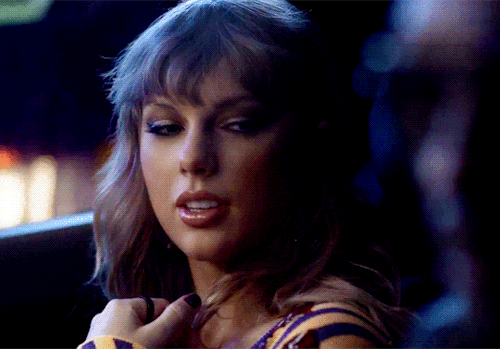
*pretends I am calm and that the fae could not lure me to my doom with this song* so like Emma you really should love this song more (and @itspileofgoodthings if you don’t you should too!)
#so it goes#taylor swift#reputation#batcat#reylo#thelonelybrilliance#this is it emma this is why i love so it goes so much#and i'm not saying you should love it better than every other tswift song but you should#lol nah i just hope i can help you like it just a little better than you already do!#also so it goes and i know places are inextricably linked in my head so#there's that
29 notes
·
View notes
Photo
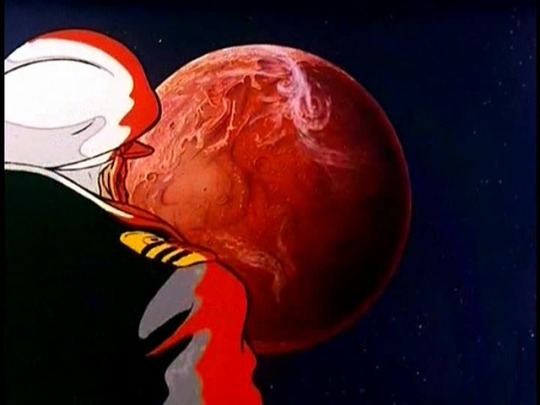
EPISODE 1
“I cannot bear to see what has become of Earth. Once green and growing, with blue lakes and silver streams, great rivers and mighty seas! Now, all gone! Only day and burning desert left, radiation everywhere!” - Captain Avatar
So begins the very first episode of STAR BLAZERS, first broadcast in syndication on Monday, September 17, 1979. It’s an opening, and indeed an episode, utterly unlike anything else then being broadcast on American television at that time--and it still retains all of its emotional power.
It’s a very strange episode in one sense: you don’t get to the actual premise of the series until Episode 2, so this first installment is almost entirely backstory. But the one thing it does brilliantly is to establish a sense of hopelessness and despair--not at all common things in a children’s cartoon. From the very first line uttered, we see that the Earth is in a terrible state, literally on the verge of extinction--and things will not get much better for the next 23 minutes.
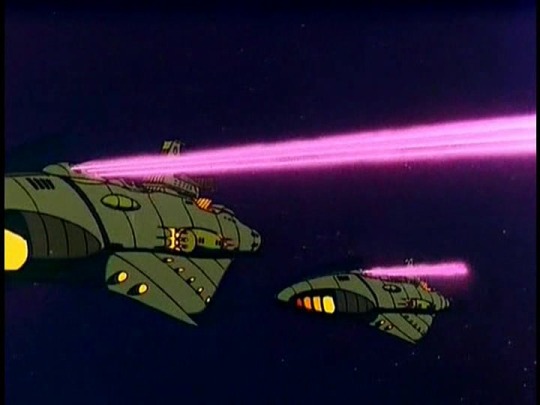
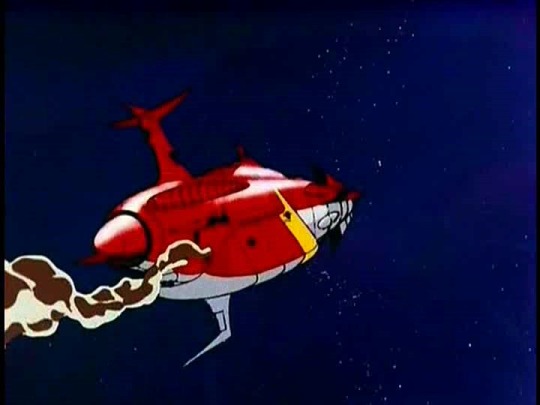
STAR BLAZERS was freely adapted from the original SPACE BATTLESHIP YAMATO, first aired in Japan in 1974. But the producers made a number of changes when importing the series for the American marketplace. Chiefly, these alterations involved the removal of sequences of excessive violence and culture-specific touchstones that wouldn’t translate to an American audience. But in a number of cases, they played around with the actual structure of the episodes themselves.
In YAMATO, the state of the Earth isn’t revealed until the halfway point, when Captain Avatar/Okita’s crippled battleship returns from space. But in STAR BLAZERS, that entire sequence is moved to the front. And so we learn immediately that the planet has been poisoned by a superior enemy from outer space, that Earth’s space fleets have largely been defeated and destroyed, and that the whole of surviving humanity has relocated to cities constructed miles deep inside the Earth itself. In terms of presenting the emotional power of this idea, I think I prefer the STAR BLAZERS arrangement, where the narrative cards are put on the table right away.
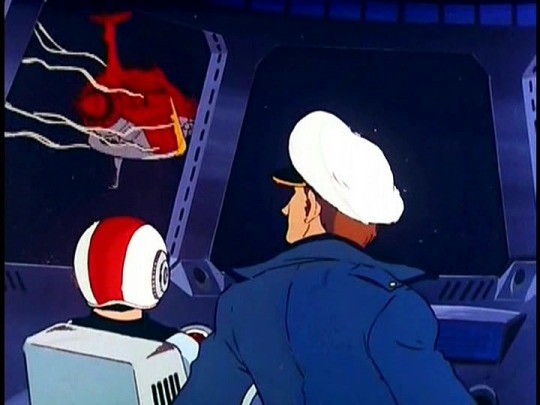
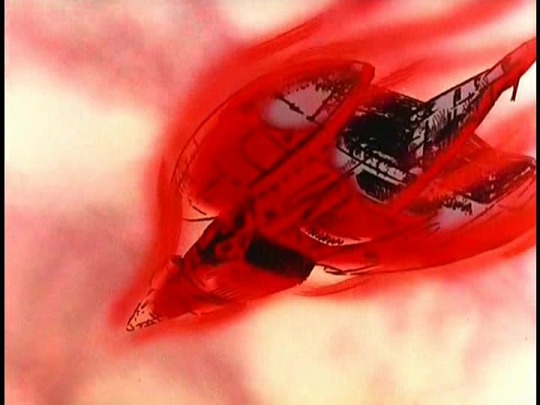
The episode is also canny in terms of how it lays out its cast. Coming into it cold, the viewer has no idea which characters are meant to be regulars and which will not. So when we’re introduced to Alex Wildstar, commanding the missile ship Paladin among Captain Avatar’s last remaining space fleet, it’s only natural to assume that he’s going to be a central player.
A quick word about the character names. Yes, they are all just a little bit silly--but honestly, no sillier than Luke Skywalker and Han Solo, or Starbuck and Apollo. The production team was really following the conventions that had been recently established for naming your space-faring heroes. Honestly, the most remarkable thing about it is the choice of a non-traditional first name such as Derek for their lead character. It’s not especially common, and like Luke, it’s got a certain cadence to it. The contrast personality-wise between Derek Widstar and Mark Venture is apparent right in their names. You can hear them and immediately get a sense as to what sort of character they are.
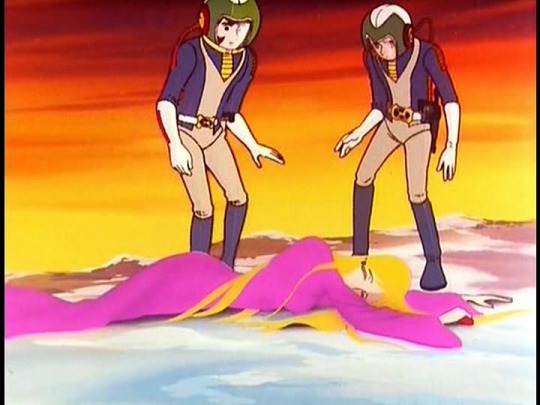
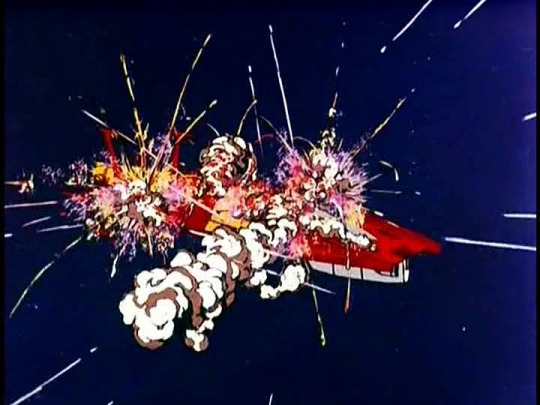
Perhaps the most remarkable thing about this first episode is the sacrifice of Alex Wildstar. Especially in these early episodes, the production team appears to struggle with just how they’re going to deal with all of the very serious situations they’re going to encounter during the course of the series. In some cases, they’ll splice in footage to ensure viewers that a particular character survived an obviously-fatal encounter or to obfuscate a death. Past a certain point, though, there’s a sense that they realize that they’re not going to be able to keep this pretense up, and so they largely abandon it, leaving it only for the most extreme cases (”Knox got out just behind you!”)
And in 1979, the apparent death of Alex Widstar is strong stuff. he goes out a hero, of course, sacrificing his ship and his crew to allow Captain Avatar the time to retreat (”It’s just a simple matter of mathematics, sir! There are 470 men on your flagship! There are 20 on our ship!”) But his death is actually mourned, and felt, throughout the remainder of the episode. We see its impact directly, on both Derek Wildstar and on the old, grizzled captain, and it’s the event that defines their relationship. Tragedy was also not something we were used to experiencing on weekday afternoons.
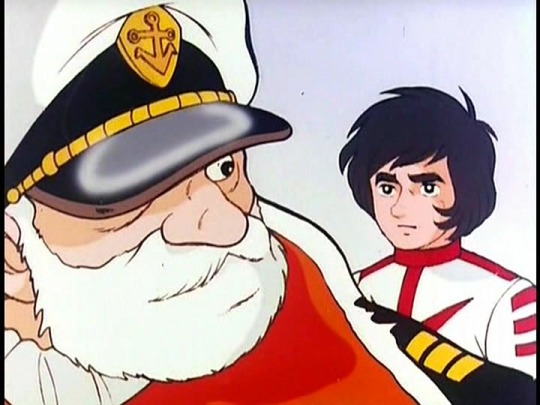
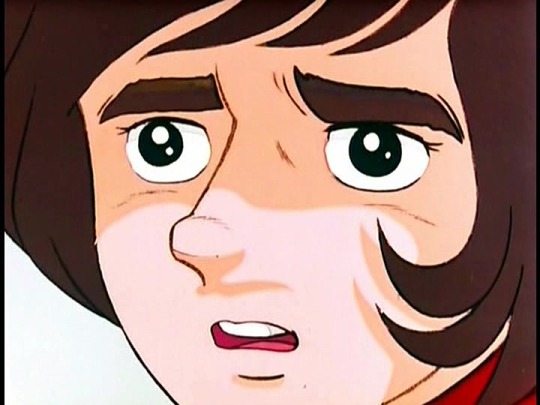
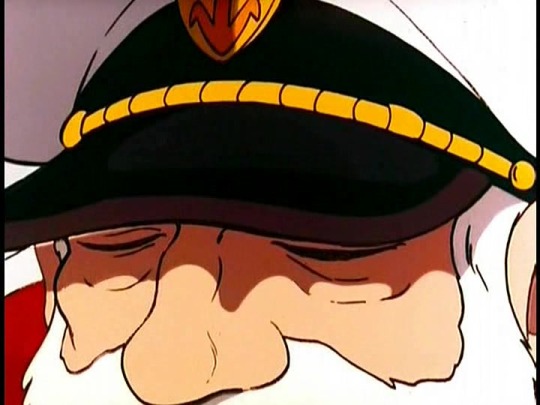
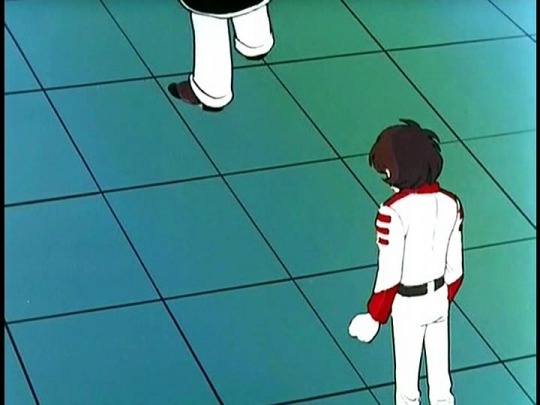
No less affecting is Wildstar and Venture’s descent into an Underground City after they’ve returned from space with the message capsule from Iscandar, and we follow that geiger counter as it ticks away as they go. and they speak about the inevitable oblivion that they and all they love are facing. No two ways about it, this is a depressing episode, and it doesn’t pull its punches much in terms of getting across the themes and the stakes.
But it’s not all doom-and gloom. There is, of course, the message of hope from Starsha of Iscandar, promising the Earth the Cosmo DNA that can restore it to prosperity, and delivering unto humanity the plans for the Wave-Motion Engine that can help mankind to bridge the unfathomable 148,000 light years that separate the two planets. There’s also some light fun to be had as a few other key players are brought onto the canvas, Dr. Sane and the robot IQ-9, as well as his nurse, Nova.
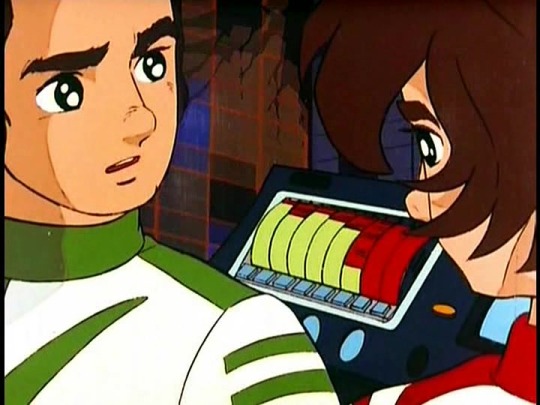
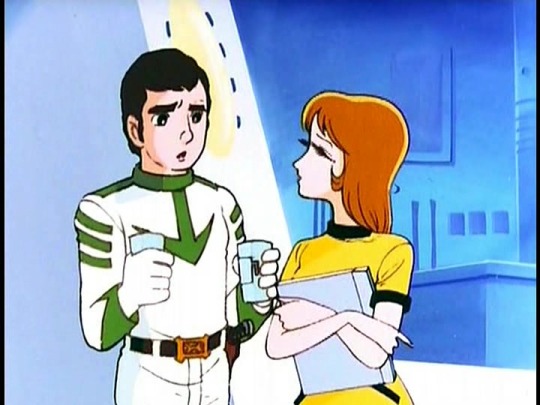
It’s perhaps worth pointing out that, in the entirety of this inaugural episode, we never so much as see a Gamilon. They are a faceless, implacable enemy, represented only by their ships and planes and guns. This parallels the experiences for the characters as well, as we will learn that, one big narrative mistake to the contrary, most people on the Earth have never laid eyes upon the enemy who has brought them to such ruin.
From a creative sense, it seems to me that this taps very much into the sentiment of post-WWII reconstruction-era Japan, the time in which most of the creative staff of YAMATO grew up. That same sense of defeat, of humiliation, of helplessness in the face of destiny permeates throughout this episode. In a very real way, YAMATO is WWII-era wish fulfillment: “what if, when American unleashed the Atomic Bomb on us, we were able to hold out, and send our strongest ship, the representation of our nation and culture, against them!” For many of these creators, they themselves may not have come into contact with an actual American.
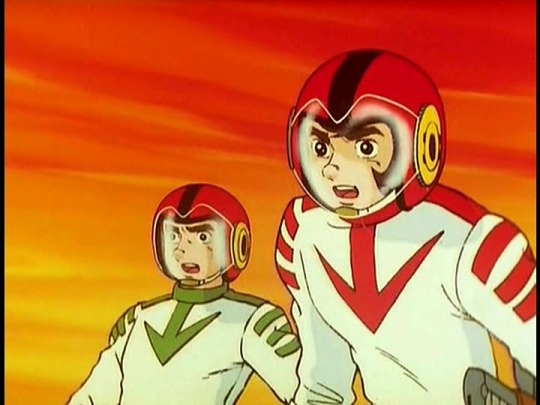
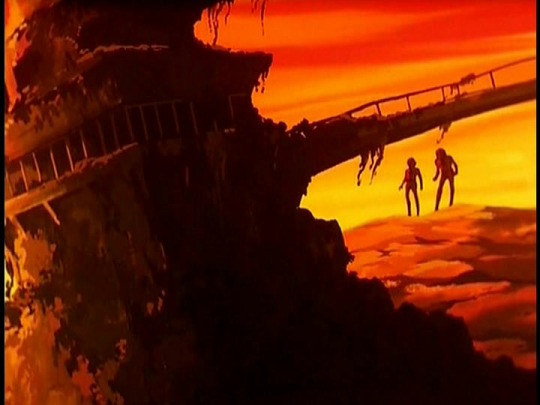
And so we come to the wrap-up of the episode, wherein the battle-hungry Wildstar and Venture steal a fighter to attempt to engage an enemy plane making a sortie above the sunken battleship, the Yamato. At this point, we still don’t really have any idea what this show is going to be about, but we get our first taste after the two cadets crash in the dry sea bed, and the strains of that soul-stirring theme music begin to swell as they crest the ridge.
The music was a big part of what made STAR BLAZERS work. That original YAMATO score is so powerful and evocative that those of us who watched the show sought it out, on record albums and cassettes once we became aware of their existence. It must also be said that while the STAR BLAZERS theme song is itself rather silly--I expect there isn’t a STAR BLAZERS fan of the era who wasn’t taunted by other kids mockingly singing portions of it--it’s also strangely affecting and sincere. It’s about something, it resonates.
And so this first episode closes dramatically, with the view of a 200-year-old decayed, sunken battleship and the narration uttering the question that will bring us back on Tuesday: “What is the secret of this ancient battleship?” We will soon find out.
6 notes
·
View notes
Text
Lucifer Season 5 Episode 9 Review: Family Dinner
https://ift.tt/3yHo0NY
This Lucifer review contains spoilers.
Lucifer Season 5 Episode 9
“All I wanted was a nice family dinner.”
After a nine month Covid-19 related hiatus, Lucifer returns to Netflix for the second half of its fifth season, and the family dynamic changes dramatically with the introduction of Dear Old Dad to the mix. Throughout the course of its run, the series’ writers have masterfully woven a crime-of-the-week drama into the fabric of the emotional turmoil the core characters, both celestial and mortal, experience in their everyday lives. “Family Dinner,” takes this narrative technique and sets into motion a series of events that promises to examine these intimate relationships that ultimately speak to the higher themes of love, devotion, and sacrifice.
With any other show, God’s corporeal appearance on Earth would be the central focus of the episode, and while His role certainly allows His sons to air their individual paternal grievances, it’s difficult to ignore the eventual impact this family gathering has on Lucifer’s relationship with Chloe. Needless to say, theirs has been a romantic rollercoaster ride, and despite his difficulty telling her that he loves her, their connection, at first, appears to be moving in the right direction. She tells Dan that she and Lucifer have “hit a snag,” but Lucifer’s brutally honest admission at the episode’s end can’t help but alter their ability to work together as partners moving forward and potentially end any hope they have of finding happiness as a couple.
However, it’s Lucifer’s capacity for self-destruction that dominates this poignant scene because it’s clear he completely misreads his Father’s signals during the extended dinner scene that occupies a good chunk of the story and applies it to his relationship with Chloe. Lucifer confronts his Father about the emotional tortures each of His children has weathered, but it’s obvious he feels he’s been dealt the worst hand. Nevertheless, the flash point occurs when Lucifer forces God to acknowledge the fundamental question with which all children wrestle at one time or another. “Dad, did you love us?” Of course, we can debate the wisdom of God’s answer to his son, but it’s Lucifer’s clumsy deduction that ultimately sets the stage for yet another misguided attempt to spare Chloe from what he perceives to be a situation rife with pain.
Read more
TV
Lucifer Season 5 Episode 8 Review: Spoiler Alert
By Dave Vitagliano
TV
Lucifer: God Takes Charge As Dennis Haysbert Joins Season 5
By Dave Vitagliano
Though Lucifer consistently forces us to question aspects of our own lives and relationships, “Family Dinner” goes down that often dark path so many families choose to avoid at all costs. Despite Lucifer’s condescending remarks about his Father’s seeming lack of omniscience, God’s refusal to succumb to these taunts opens the scene for each to lay bare his greatest concern. While it’s Lucifer that openly challenges his Father about His decision to withhold a confirmation of their father’s love, Amenadiel and Michael grapple with their own inner demons. Understandably, Amenadiel fears the pain his mortal son will face as he grows up, and the beautifully executed exchange he has with his Father forces him to accept Charlie’s fate notwithstanding his touching offer to surrender his own immortality.
All of which leads to Lucifer’s announcement to Chloe that he’ll never be able to tell her he loves her. As it typically does, the murder investigation brilliantly parallels the personal narrative taking place within Lucifer’s sphere, and despite his recognition that Chris Peterson died protecting his father’s mini-golf kingdom, our bedeviled protagonist can’t see the forest for the trees. It’s true, God declines to explicitly tell his children he loves them, but the subtext should be obvious to anyone who’s able to truly listen above the self-loathing din. But even if Lucifer believes his Father incapable of love, it’s difficult to accept that he can’t see the personal growth he’s exhibited since he’s been in the company of Chloe and the others. Everyone within Team Lucifer understands that he clearly loves the detective; whether he’ll ever accept that fact remains to be seen.
While the episodic components don’t all scream doom and gloom, Ella struggles in the aftermath of her relationship with a serial killer, and Dan begins to accept that he’s the latest mortal to be read into the reality of the Devil on Earth. We know Miss Lopez will move on from her horrific experience, but things may not go as smoothly once she realizes she’s the last remaining member of the team to learn of the existence of celestials on Earth.
It’s true the family dinner casts a bit of a pall over the proceedings, but we shouldn’t overlook the beautiful moments that appear throughout the episode. How about we begin with God’s choice of a beige cardigan and the fact that Dennis Haysbert is about as perfect a choice as there is to play the Supreme Being. His touching exchanges with Linda and His propensity for cradling baby Charlie leave no doubt that God’s children are wrong about His feelings for them. Even though Linda’s been read into the celestial throng’s existence longer than anyone else, God’s appearance in her home throws her for a delightfully executed loop nonetheless. Still, He makes a point of praising her whenever the situation arises. His insistence that she’s part of the family leads into her uncomfortable attempt at saying grace, and it’s His acknowledgement that her thankfulness for the mundane that reinforces the fact that Lucifer simply doesn’t get it. It really is a wonderful moment.
Still, the use of the celestial family as a metaphor for the struggles all families eventually encounter drives home one of the central themes explored in Lucifer. Love comes through actions, not words, yet for some reason, Lucifer can’t seem to accept that about himself. Needless to say, he’s quick to accuse God of being a poor father even though his own inability to tell Chloe how he truly feels about her essentially functions in the same manner. Of course, God loves his children, but with great power comes great responsibility. And while Amenadiel generally lives up to his Father’s standards, the same can’t always be said of the others. Perhaps it’s time for the celestials to bear in mind an axiom mere mortals have acknowledged for millenia – God works in mysterious ways.
cnx.cmd.push(function() { cnx({ playerId: "106e33c0-3911-473c-b599-b1426db57530", }).render("0270c398a82f44f49c23c16122516796"); });
It’s difficult to explain the elegance with which Lucifer continues to explore not only the duality of human existence but the crises of faith both mortals and celestials continually face. With Haysbert’s introduction as the family Patriarch, “Family Dinner” takes the series to new heights, not an easy feat for a show that already enjoys a significant amount of critical acclaim. But do we really believe God plans to sleep on a futon in his son’s home?
Lucifer season 5 is available to stream on Netflix now.
The post Lucifer Season 5 Episode 9 Review: Family Dinner appeared first on Den of Geek.
from Den of Geek https://ift.tt/3uvbJsK
0 notes
Note
What is Time in Homestuck? What is its function, its purpose, what are timelines, what defines the Alpha and doomed timelines. How do timeloops work?
Time in Homestuck takes from a couple of theories about the workings of Time and Parallel Timelines. So, Time itself doesn’t have any Function, much like in real life, instead, Space and Time are treated as the two main building frames of a physical reality, to the point where the Universe Frog requires a Space and Time players to actually even be possible to be created.
Going in detail though, according to Homestuck’s Interpretation, there’s an Alpha Timeline that marks a path that must be followed, but there are alternate realities, sometimes required by the demands of the Alpha Timeline itself, where divergent Choices and Actions from the various characters have led to a deviation from this path that needs to be followed. A Time Loop is nothing more than ensuring no Paradoxes are created while following this Alpha. For example, according to the Alpha Timeline, Lil Cal ends up in Jack Noir’s possession, and eventually is shot through a meteor portal into Alternia. This is a stipulation that must be followed, so in the Timeline where John dies because Terezi sent him to see Typheus early? We learn with John’s ghost, that Typheus didn’t actually just insta-murder him, he gave him a Choice, to Die for the benefit of the Timeline. The thing that doomed the Timeline wasn’t John dying- It was Dave prototyping Lil Cal. Davesprite needed to exist, because without Dave preventing Lil Cal from being prototyped, Lil Cal would become a sprite, and thus never get to Alternia. This is the kind of Paradoxes Stable Timeloops want to avoid, and the reason this Timeline leaves behind a Doomed Rose. We see in a couple of occasions, Daves dying when a Time Loop is broken- When Dave screws up Time-Travelling, he creates an offshot Dave that doesn’t become ‘future Dave’, instead it’s its own iteration of Dave unrelated to the Alpha Timeline, and as such, Doomed to die. Davesprite manages to become un-Doomed by Prototyping himself into Davesprite, and thus becoming an integral part of the Alpha Timeline, rather than a Doomed Version.
Of course this still leaves the question of what the Alpha Timeline itself is. After all, we see dead God Tier Trolls, implying that actually becoming god-like is somehow not Alpha, and thus rendering the explanation of the Alpha Timeline being the ‘best’ or ‘most beneficial’ path impossible. No, in fact, the entirety of the Alpha Timeline is filled with Death and Suffering and awful things and characters being erased off the story.
This is because the Alpha Timeline is, in reality, a Time Loop that favors the Lord of Time, Caliborn. All the Alpha Timeline does is ensure Lord English is created and does what he does in the story, after all, he IS the Lord of Time, and he Commands Time itself. Paradox Space bends to his will.
[S] MSPA Reader: Mental Breakdown is a quick example of one of the Alpha Timeline’s most important devices- Lil Cal. A Juju which contains the Essence of Lord English, and needs to follow an EXTREMELY specific path to reach where it needs to reach, dividing in two at one point to become an Entry in Caliborn’s Land, through which he spreads his influence, and in which he eventually becomes trapped, and an Exit in the Lil Cal Dave has, which eventually ends in Gamzee’s Possession, and is ultimately used to convert Jack Noir into a Proxy for Lord English.
Everything in Alpha Timeline is delicately crafted to eventually lead to Caliborn’s Rise. Lil Cal is not just the Entry and the Exit, the Vessel for His Soul, it’s also the only reason why Caliborn manages to achieve full, unconditional Immortality. When he reaches Yaldabaoth’s Boon, he uses the Juju Breaker Crowbar to obtain Inconditional Immortality. Crowbar which he’s had since before he actually met ‘Crowbar’ from the Felt. Crowbar which was gifted to him by Gamzee of all people, the Troll who raised Calliope and Caliborn. Gamzee needed to be there to raise the twins, and he offered the tool that would eventually grant him Immortality. And how did both Gamzee and the Crowbar get to Caliborn? Through the Black Hole created after killing the Jack Noir possessed by Lord English through Lil Cal. Black hole which ALSO absorbed a majority of LOTAK, including its core, where the Denizen Yaldabaoth himself was, making it seem like everything relevant to Caliborn’s Session arrived there in the first place only thanks to Lil Cal.
Similarly, even the God Damn Retcon favors Lord English, even though it seems like a Canon-Breaking tool, even though it seems like something meant to bypass the Alpha Timeline in the first place, it’s actually a necessary tool for Lord English’ creation- Without the Retcon Powers, John would’ve never reached Caliborn’s Masterpiece, becoming stuck in the House Juju with the other three Betas. He wouldn’t have led the Kids that would, in turn, defeat Caliborn and suck his Soul, ARquius’ Soul and half of Gamzee’s into Lil Cal to create the amalgam known as Lord English. And without the Beta Kids stuck in the House, it would’ve never been filled in, and thus become the double-edged sword that would eventually cast Lord English into the Breach.
But of course even the Retcon favors Lord English- After all, he kills the Author. Caliborn interacts with Hussie through the Command Prompt, and physically smacks the website around on several occasions, as well as glitches the cartridge containing the data to continue the story. Doc Scratch and Vriska seem to be the only other characters in the comic to even be aware of the existence of Hussie as the Narrator- With Scratch being part Lord English, and Vriska literally getting angry at Hussie for switching the narrative just as she was about to reveal the House Juju, and tearing it back from him to show everyone what was in the Juju Chest. A Villain that messes with the Narrative itself would definitely still benefit from a tool meant to break the narrative. And in the same way, when the Villain of the Story has control over not just Reality, but the direction of the Narrative, the only two that can oppose it are a Character who Knows they are in a Story and Wants to be the Protagonist, and a Protagonist who Can Alter the Narrative and just wants to be Happy.
As such, Homestuck takes the idea of ‘parallel timelines’, and throws us a scenario in which an evil entity has basically overwritten Free Will through imposing himself in a very specific path, so if I had to give a short answer to the question of what “Time” and “The Alpha Timeline” is? I’d have to answer, The Alpha Timeline is Homestuck in itself, both the story and the struggle of the characters as they navigate through it.
( From this point downwards, these are my THOUGHTS and opinions, and may not reflect what’s strictly Canon or what may happen in the future )
This ties in to my thoughts on why I think Act 7 is good, contrary to what many in the Fandom seem to believe. We’re shown Caliborn’s rise to immortality, the beginning of his journey towards becoming Lord English, and eventually becoming the big villain of the story, contrasted with Vriska inserting herself in the role of the Heroine, even though everything was already set in the story for this exact same culmination and all she did was take the spotlight by opening the Juju Chest, and the Release of the Kids from the Alpha Timeline to live in Earth-C, free of the influence of Lord English, of the grasp he’s had on their choices and their existence.
Already at the very beginning, John himself states it clearly.
It is your thirteenth birthday, and as with all twelve preceding it, something feels missing from your life. The game presently eluding you is only the latest sleight of hand in the repertoire of an unseen riddler, one to engender a sense not of mirth, but of lack. His coarse schemes are those less of a prankster than a common pickpocket. His riddle is Absence itself. It is a mystery dispersing altogether, like the moon’s faint reflection, with even one pebble of inquiry dropped in its black well. It is the most diabolical riddle of all.
When the Kids cross the threshold of the Door to the new Universe, the story ends canonically, because they’ve escaped the Time Loop known as the Alpha Timeline, they’re beyond English’ Realm. They are no longer Stuck, and they’re free to make their choices without fearing the creation of an offshot Timeline or worrying about what may happen in the future.
It’s my belief that the fact we see Caliborn with the Ring of Life Calliope has, that two Nannasprites exist without one dying, and a few other details such as Caliborn stating seeing himself surprised at the Kids appearing to face him using John’s Retcon Powers, means that this is not following the Alpha Timeline at all by the ending. John’s ‘I’ll do it’ has sparked many theories about this being the conflict that sparks John to want to go back to fight Caliborn, but it has always seemed nonsensical to me. John is depressed, Terezi is looking for Vriska, but for most of the part, they’re happy. They’re content with having gone through the hardships of the Game, and now being able to just live their lives. I could maybe see John using a fight with Caliborn to mask his emotions, but I can’t see him convincing Rose, happily married to Kanaya, that they should go back to beat up the stupid asshole that keeps Trolling him through Snapchat, using his highly dangerous Retcon Powers.
To me, it always felt that this was the result of a Timeline we didn’t see, but may see in the Epilogue, and even though there are ways to make it work, it ties perfectly well to this theme of breaking out of the Alpha Timeline, that by the end of the comic, we wouldn’t even be following the Timeline that spawns Lord English, and rather, the one the John we’re following, seeing master these Retcon Powers, creates following Terezi’s Instructions.
Ironically enough, this Timeline ends as an empty victory for both John and Terezi. John, with his adventure over, and having never seen inclined to even think what he may want to do after it’s over, is now left alone with his thoughts, the trauma he’s went through, and missing his father, while Terezi, who in the Game Over Timeline thought all she needed to be happy was Vriska, realizes that even that is more of a patch for some deeper self-steem issues, and yet continues to try to chase after her around the crumbling Paradox Space for no avail for years.
It’s my belief, when the Epilogue comes out, that we will see a distinction between the Timeline in which John reaches Earth-C, and the one in which they all go to Caliborn’s Masterpiece, as well as have Terezi return to Earth, not with Vriska, but with Davepeta, Sollux and Aradia, who are still potentially alive and out there. But that’s mostly because I don’t think Vriska should survive the encounter with Lord English.
Vriska herself, in this case, climatically becomes what she’s always wanted to be, the protagonist, only by her desire to be as such. She treats the Game of SBURB like a Game, and similarly, she treats Homestuck like a Story, a Story in which she wants to be seen as the Heroine. Not for Noble or Heroic reasons, but merely for the hell of it. She becomes the perfect Counterpoint to Lord English- The man who set the Alpha Timeline, whose existence jeopardizes the entirety of Paradox Space, the unseen, mysterious hand behind every event. Lord English becomes the Villain of the story, and Vriska takes advantage of it. A story needs a Villain and a Protagonist, and with John more focused in his Friends than the Big Bad, she steals the role for herself, which would make seeing her never actually return, all the more fitting. Act 7 is the Finale. It’s the End of the Alpha Timeline, the End of the Story that is Homestuck. So of course, once the curtains are drawn, both Villain and Protagonist are out of the picture entirely.
#Homestuck#John#Vriska#English#Caliborn#Long Post#Time#Lord#Cal#Breach#Canon#Theories#rapture#retcon#masterpiece#Doc#Terezi#Rose#Dave#Davesprite#hussie#jack#typheus#yaldabaoth#earth-c#End Of Homestuck#Homestuck Spoilers#HS Spoilers#Spoilers#Denizens
96 notes
·
View notes
Photo
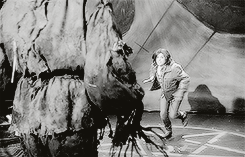


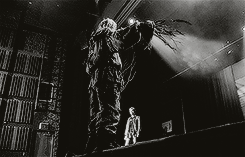
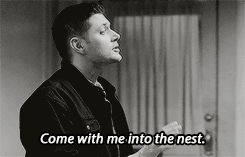

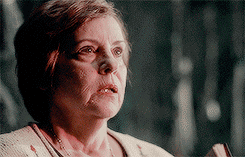
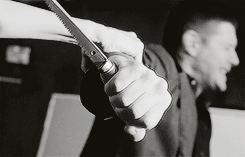
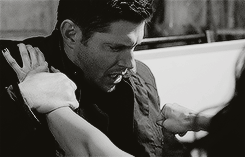

10x05 “Fan Fiction” // 11x13 “Love Hurts
11x16 “Safe House” // 12x20 “Twigs & Twine & Tasha Banes”
“Of Twigs & Twine and Scarecrows & Tin Men” or “The Thing about Hearts and Minds”
I finally found timt to rewatch the episode and write few thoughts down. I know this is probably not interesting to anyone anymore as it’s been a couple of days, but I feel like typing this out anyway.
The symbolism and metaphors surrounding the “Wizard of Oz” have been introduced in Carver Era in S8 and have been used repeatedly in relation to the entire MoC arc and also carrying on and over to the Darkness/Amara arc which of course could also still be considered the MoC arc. Especially last season @lost-shoe and I have been talking a lot about how Amara and how she used “mind control” and was able to pull Dean’s strings parallels and compares to Calliope in 10x05 “Fan Fiction” working her magic by controlling the scarecrow (missing a mind of its own) to protect the narrative and story the high school kids had penned about “Supernatural”.
Since that episode in S10 a lot of time has passed and S11 saw Dean losing his free will and agency to Amara and it was heavily suggested all throughout the season, like in episodes such as 11x16 “Safe House” that Dean may truly be turned into a puppet and a screcrow to Amara’s will at some point down the line. Of course that didn’t happen, but it seem that Dabb has taken said arc and trasnferred it and re-imagined it, so that one season later we may end up at a similar point as last season was meant to end at (because we know that the season was meant to end differently as initially God was supposed to die, but the CW wouldn’t allow that), because thrughout S12 rather enragingly for anyone who cares about Dean the narrative has framed Dean to be losing his agency and free will and his choices and wishes being ignored by the people closest to him and them by that action in extension turning Dean or rather treating him like a scarecrow - ignoring Dean’s input and thoughts or doubts or apprehensions, basically his mind - while the season as a whole to me lacked one thing in particular: emotion. Or differently worded and coded in “Wizard of Oz” language: heart. Because Dean’s emotions too were walked all over ignore or rendered as either “over the top” or “unimportant” thus effectively treating Dean also like the tin man, missing his heart.
Now this week’s episode brought both the scarecrow and tin man symbolism back in a major way and intertwined both with one another and I personally feel that it shows rather heartbreaking and dark things ahead for Dean - and yes, I know I’m biased cause I’m a Dean!Girl and that’s where my focus goes, so all of this may end up completely wrong, but I’m going to type it out anyway, because this week’s episode was thick with narrative callbacks visually as well as thematically to a few episodes also focsuing majorly on the heart or the loss of it and the mind and mind control.
Of course Max’ and Alicia’s story was meant to call back to the entire Supernatural origin story with the missing mom opposed to a missing dad, a deal with horrific consequences and two siblings who head down dangerous and dark paths, because they can’t live without the other. And while the Banes’ tale of the week definitely called back to a multitude of past Winchester mistakes and tragedies, I feel it may also be rather suggestive of what will happen in the season finale.
@lost-shoe has been talking a lot about how this season has been playing with Dean death allusions and while I personally don’t think they’ve been handled consisently or rather well, I agree that in the second half there were a few things suggesting Dean will pay the price - his life - for his loved ones walking all over him during the season and that maybe being resolved with Dean actually truly becoming tin man and scarecrow after he has been treated as those all season and the events of the latest episode to me suggest it is entirely possible for things to go that bad (As a brief in between, what still bothers me majorly about this entire arc is that Dean when he dies due to how he was ignored all season, this entire arc wasn’t about him, that would only be the case if Mary or Sam would be framed in a way narratively that suggests that they realize that they should have been more open towards Dean’s words, but that is sadly not the vibe I am getting from this arc, but rather feel that Dean will just further be used as a prop to propel other characters’ stories - namely and in lin with this week’s episode and siblings decision for Sam to possibly go to rather dark ends to “bring Dean back” - should he really die).
Because the callbacks to Calliope and the scarecrow were to be caught in the details, such as the robe the witch wore or the colours of the flowers

the concierge arranged or the creepy doll (which was of course another nice allusion to the whole puppet theme of the episode as well as Dean waking up among flowers when first meeting Amara in S11) on the stairs wrapped also in purple. It’s impossible to see due to the colouring I worked with on the gifs, but the purple definitely aligns Calliope and the old witch. But of course not just through that. The witch literally turned these people into scarecrows, made out of twigs and twine. She made them “her creatures”, puppets she can control and pull the strings of, “beings” she can mind control while she killed the real people by ripping out their hearts and making the real person tin men, corpses missing their hearts. That action as such also called back majorly to last season’s episode “Love Hurts” featuring the quareen, that set out for its victim’s hearts and could only be stopped when its own heart was sliced apart. Only after that it dissolved into nothing in a similar fashion as the witches puppets/scarecrows turned to dust once Dean shot her.
Now, as I said during live watch already on friday, the colour combination Dean wore during this episode is heavily tied to topics of loss of self and mind control as they were presented in the MoC and particulary the Amara arc. It’s not accidental imo that we saw Dean wear the red shirt of doom and the dark blue jacket on top here, because - as I said above - I think this season will end very bleak (but when is it ever not lol). It’s not just the colour and clothing however that to me suggests tragedy ahead, it’s also

how in this shit for example Dean is directly framed with the scarecrow-esque twigs and twine creature thing behind him. Most of all however it’s the Banes’ siblings serving as the biggest warning sign, because Alicia - Dean’s mirror - dies and her brother, unable to let her go, makes a deal, takes a burden (yes, it’s all an MoC repeat and callback to Sam removing the MoC too, hell even the silly knife looks like the first blade sigh), overrides his sister’s agency, carves out her heart, makes her a tin man and puts it into the scarecrow. It is all kinds of messed up when you keep in mind that he has the power to control her now, even worse that she is “not real”, but he takes that as better anyway, plus Alicia may have all her memories, but she is hollow in the end, she doesn’t know she’s not real - it’s also a parallel to Mary and her return and her struggle.
So if you keep this in mind and treat this episode as a piece of foreshadowing - and this episode seemed thick with it - then I think it is not out of the real of possibility that Dean will die, painfully likely, due to his loved ones misplaced trust and ignorance over his doubts and thoughts all season. And I think that either Sam or Mary (should she not die or raise Baby Lucifer and walk away) will make some sort of deal, bringing Dean back maybe, but just the scarecrow version of him anyway... And if they went there it would allow them for Dean to still be around, but not as truly him of course (@suebsg9 I am going to reply to your ask in here, because it feels fitting), so maybe what Jensen teased with “something purgatory-esque” happening could be the true and dead and now heartless, tin man!Dean either locked up in the Empty after all (which would fit the pattern of something being released and locked away - where Dean usually gets to be the one ending up locked away in some other dimension) or he may go to Heaven and the scene the boys talked about before with lots of beloved character being part of a scene they shot for S13 ends up being at Harvelle’s or something. But of course all of this is just crazy spec.
But just to mention it last but not least, the topic of mind control here also directly relates and connects to to the nephilim arc as well as the BritMoL arc as the gifs hopefully can capture above. Dean in this episode said outright in the beginning that Lucifer Jr. isn’t even born and is already “sock puppeting” Cas, meaning mind controlling him. Likewise Ketch when tieing Mary to a chair that reminds a great deal of the one we saw Naomi torture Cas in also S11 is revisited when he tells her that “he can keep her safe” even if everything else falls apart as long as “she plays her part” - which of course calls back to Calliope who protected the narrative in the musical, but also reminds of Dean when he was possessed be the soul eater and tried to coax Sam into giving in.
#SPN spoilers#SPN Meta#Supernatural Meta#Dean Winchester Meta#Dean love club#SPN speculation#12x20#Twigs & Twine & Tasha Banes#10x05#Fan fiction#11x13#Love Hurts#11x16#Safe House#Visual and narrative callbacks#Dean as the tin man#Dean as the scarecrow#Amara#Mark of Cain#Loss of self/agency#Mind control#Crazy thoughts#Dusty Gifs#Gif Meta#10x05gif#11x13gif#11x16gif#12x20gif#Queued
54 notes
·
View notes
Text
anon asks:
Hi! I really enjoy your asoiaf m/eta - I was wondering, do you think that Jaime is on his best way to become Tywins "true heir", a scenario in which Brienne has a role similar to Joanna's? I.e. Jaime's genuine affection for her becomes his only sympathetic quality in the end, much like Tywin's genuine love for his wife appears to have been is only truly likable trait? Not to reduce Brienne (or Joanna) to that alone, but it would emphasize Jaime's doom and her rise nicely.
Hi, thank you! A couple things first, before I sink my teeth into the rest:
a) this is in no way an objective statement, but no matter how his arc ends, even if it goes the darkest way possible, Jaime has plenty of sympathetic traits (not necessarily qualities, mind) that allow me to find him relatable, and this makes him ALREADY incomparable with Tywin;
b) I don’t believe in love being a sympathetic quality or a mitigating factor per se, and I don’t think people who love are necessarily one step closer to *goodness* than people who don’t. For example, while I don’t see Stannis as necessarily incapable of love—I quite like the idea that under his stern facade there’s a lot of feelings, for his child, for Jon, for Davos, and maybe even for Melisandre, on top of his complex issues with his own brothers—even if we stick to the interpretation of Stannis as a loveless character, I don’t think this diminishes his fundamental goodness. On the other hand, there are the Lannisters, who are fifty shades of questionable, but they ALLL love so much!
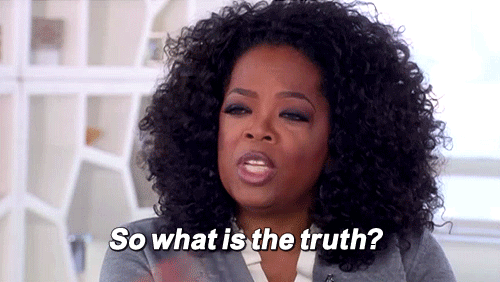
The truth is that anyone can feel love. It’s not that special, you know? It’s just a human emotion—powerful, but not inherently moral. Not intrinsically a virtue, an end to be pursued at all costs, in itself and for itself, as traditional romantic narratives would want you to believe.
This is particularly true for a character like Jaime, who has been established as a lover since his first notable appearance in the books.
“The things I do for love (he said with loathing)” is probably his most iconic line, and it’s no coincidence that it’s associated to the TERRIBLEST, EVILEST THING he’s ever done (no irony). Jaime's debut in asoiaf is tied to the concept that lovers aren’t ALWAYS right just because they love, and to some extent the character himself is aware of it ("loathing” refers not to Bran, whom Jaime has really no reason to loathe lol, but to “the things I do”, aka the repulsive action he’s about to commit in the name of his love for Cersei). So the idea that Jaime’s ~one and only~ sympathetic quality can be his love for Brienne, when loving is both his original sin and virtually the only thing he’s done in his life, doesn’t work for me. (you might argue: but Jaime’s love for Cersei is incestuous and Badwrong, and Cersei herself is Bad whereas Brienne is Good! yeah, I think that line of reasoning is a slippery slope, because it places all the emphasis and the responsibility on who you love rather than how you love, as if the moral fiber and ~appropriateness~ of the object of your love is what makes your love noble. Mind, this is a very courtly-romance logic, so it’s nothing especially offensive, but I still don’t like its implications. It runs a bit too close to “bad people don’t deserve to be loved” to suit me).
with that said…
denying the centrality of love in these novels would be a terrible mistake. George is a romantic, and his attitude towards some romantic tropes isn’t deconstructionist at all, but rather a vibrant (albeit complex) celebration of them. Yet not all fictional depictions of romantic love are equal: I think Jaime/Brienne and Tywin/Joanna belong to two different genres.
Jaime/Brienne is essentially a fairytale. It’s, of course, Beauty and the Beast. A tale about transformative love—love as acceptance of the other, love as understanding of the other, love as healing, love as the driving force for a radical viewpoint shift, a change of attitude and lifestyle (symbolized in the original tale by the physical metamorphosis of the Beast), love as having an actual positive impact on the world. As everyone knows, Martin loves the trope and makes it integral, more or less subtly, to several dynamics throughout the books. It has been stated repeatedly, even by the author himself, that Jaime and Brienne is one of those; the only question is whether there will be a subversion, and to which degree. Personally I’ve always seen as subversive the way GRRM gets rid of the problematic goodness = beauty equation (that exists in the original because fairytales are highly archetypal and symbolic and they rely heavily on simple visual associations, but they’re also inevitably intertwined with societal/cultural biases and the primordial fear of the imperfect and the deviant) and throws in the mix a Beauty who is actually Super Ugly! and a Beast who is a splendid, glorious, golden lion. When the Beauty is the Beast and the Beast is the Beauty, and the gender stereotypes inherent to the trope are repeatedly broken, the metamorphosis is necessarily mutual.
Can this fairytale have a tragic ending? Absolutely. Martin is a master at this—it’s actually what his deconstruction is about, taking fantasy/fairytale tropes and adapting them to completely different genres, causing that sort of cognitive dissonance in the reader, who isn’t used to see THAT trope take THAT form (see: “Martin kills all the heroes!”). However, whatever the deconstruction at work is in JB’s case, i doubt it will end up completely negating the transformative nature of the trope itself. But let’s set this aside for now, because it’s not relevant to the discussion.
Tywin/Joanna is different in genre, scope, meaning, basic tropes. To begin with, I don’t see Joanna as the Beauty to Tywin’s Beast. There’s no clash between two conflicting worldviews here; their love isn’t of the transformative kind, it’s a love that cemented their established identity, rather than challenge it. I think this pairing is written around a completely different cluster of tropes—the power couple, the “behind a powerful man there’s always a powerful woman”, and the dead mother/wife. I like to think of Joanna’s death as transformative in the sense that it represents the loss of the feminine---it creates an unbalance in an already awfully masculine-coded family, whose aftershocks still affect the lives of all her children even decades later. In short, Tywin/Joanna is a tragedy.
(seriously: if you’re looking for a parallel to Tywin/Joanna in Jaime’s narrative, a “humanizing the monster” kind of love, look no further than Jaime/Cersei. Jaime’s love for Cersei humanizes him, and Cersei’s love for Jaime (and her children) humanizes her. Unfortunately, the narrative makes it clear that theirs is a (figuratively) sterile, doomed kind of love. Like in a greek tragedy, we feel sympathy as we clutch our chests in anticipation for its inevitable collapse. Fate did to Tywin/Joanna what a downward spiral of irreconcilable differences, deep-seated grudges and destructive actions did to Jaime/Cersei, but the end point is equally tragic.)
Also: Jaime’s BATB dynamic with Brienne is not a “sympathetic” footnote squeezed in between his villain arc A and villain arc B, nor something that can be reduced to “his only likable trait” and waved off. It’s a crucial aspect of his arc (and Brienne’s, who is—let’s not forget—a major player from AFFC on) and has ramifications on the overall plot (Oathkeeper, sending Brienne after Sansa, Lady Stoneheart, not to mention the discussion around honor and oaths that is a central theme in asoiaf). It’s not a coincidence that Jaime is introduced as a pov only after he meets Brienne. This dynamic is integral to the story George is telling.
In comparison, Joanna (and by extension Tywin/Joanna) is something that belongs to the past, and only affects our story indirectly. It’s a dead character and a dead relationship. And that’s what marks the biggest differences, not only with Jaime/Brienne but also with Jaime/Cersei. Joanna, in the context of the narrative, is remarkable for her ABSENCE. It’s her death, the void that she created much more than her life, that has an impact on the characters. It doesn’t help that Tywin, the one person who’s able to remember her as a fully fledged human being, isn’t a pov either. GRRM gives us only scraps, and it’s up to those of us who care to put together the pieces of the puzzle of who Joanna used to be. This is, of course, a despicably convenient treatment of a female character on the author’s part, even more despicable since it’s not an isolate case in asoiaf. There’s no easier way than a dead mother to fabricate a sad background for your protagonist, and it also solves the problem of making her fit within the narrative, giving her an actual personality and things to do, etc. We expect better from a writer of Martin’s calibre, and that’s where the criticism comes from.
But lazy sexist writing aside, why does George give us so little?
I think it’s (in no small part) because he understands the power of certain romantic tropes, how they seduce the reader’s imagination—how humanizing they are. Tywin’s love for Joanna and Joanna’s love for Tywin, if explored in depth, would humanize Tywin to the nth degree.
But Tywin isn’t supposed to be given the sympathetic treatment. Of course, GRRM knows better than make him a cardboard villain, so he gives him nuance, he gives him contradictions, among which there’s a dead wife he loved fiercely. But he doesn’t flesh it out. He doesn’t give us a detailed story, only scattered bits and pieces, generally second and third hand information. This relationship isn’t made for the stage but for behind the curtains, because Tywin’s ~feelings~ need to remain veiled and largely inaccessible to us, just as his inner monologue is: we aren’t supposed to sympathize.
Jaime, on the other hand? Jaime gets a pov and TWO romantic relationships fleshed out in depth, one of which is a BATB dynamic with a heroine. His heart is on stage for everyone to see in a way Tywin’s heart isn’t—cannot be. I think it’s essential to recognize that Jaime and Tywin occupy different spaces in the narrative, and their potential to be seen as sympathetic characters is largely different. It’s hard for me not to see authorial intent in the way Jaime is perceived VS how Tywin is perceived.
This brings me to the other question you raised, if Jaime is on his way to become Tywin’s true heir. I can only try to answer this is by looking at what motivates him, at what could be a significant and satisfying resolution of the issues his character raises.
Jaime never cared for power but, like every Lannister, he strives for greatness. Now that that greatness is unachievable through his swordfighting skills, he’s looking in other directions, other possible fields to excel in. One of those is certainly Tywin: family. The other is knighthood: his other family. Both failed him, and he failed them both. The way Jaime failed knighthood is obvious to everyone, but the way he failed his ~responsibility~ towards house Lannister is subtler: by trading his birthright for a place at Cersei’s side, he basically washed his hands clean, giving Tywin free rein to further hate and abuse Tyrion in an escalation of desperate and delusional attempts to avert the latter’s ascension as heir to Casterly Rock, that climaxed with Tyrion being accused of regicide and Tywin’s death. There’s a great image in Jaime’s narrative, of the crimson and gold Lannister sigil VS the white shield of the kingsguard, but the real question isn’t which one Jaime will eventually /choose/... it’s whether he’ll ever realize he can be NEITHER.
The great lion of Lannister? That’s Tyrion. Every attempt to turn the clock back is futile. The Rock is Tyrion’s by right since the moment Jaime chose to step back and join the Kingsguard for life.
And the white shield… is Brienne. It’s always been her.
a scenario in which Brienne has a role similar to Joanna’s […] would emphasize Jaime’s doom and her rise nicely
But is Jaime Tywin in this scenario, or is he Joanna?
Because Joanna died so that Tywin could rise as the character we all know (once again, I side-eye the idea of Joanna being Tywin’s “conscience” or her death being his ~villain origin story~, but it certainly made him more unbalanced). For the parallel to work, Brienne has to die for Jaime to rise (as a true villain, as his father’s heir, as Cersei’s valonqar, whatever), which has been speculated, and which I’m aggressively AGAINST. Because Brienne is the next generation, Brienne is a character who can have a REAL positive impact on the world, while Jaime… let’s be real, Jaime is a relic. He’s a relic of Robert’s rebellion, of a time that doesn’t exist anymore. The “Greatness” ship has sailed for him long ago:
he’s never going to do anything as remarkable and controversial as murdering Aerys (oh sure, there’s Cersei, but I wouldn’t consider killing her an accomplishment. A mediocre rehash of his one and only teenage hit, at best)
he’s never going to be Arthur Dayne, either. Who the fuck wants to be Arthur Dayne anyway? That guy kept a pregnant girl prisoner. Being THAT guy would be only a regression for Jaime. He understood that there are orders you can’t follow at seventeen, why should he revert to performing his duty uncritically at thirty-five?
oh, and of course, he’s not going to outmatch Tywin. DUH, he’s TRYING, but it isn’t a primary concern or a central motivation for him the way it is for Cersei, for example. Everything he accomplishes in his military campaign in the Riverlands, he does only because people fear Tywin’s shadow, not his own. We can talk until next week about whether the trebuchet threat crowns him as Tywin’s true successor, or is actually a strategy more similar to the way Jon and Dany (and Ned) use their enemies’ children to maintain THEIR peace terms (which are fair and righteous whereas Jaime’s aren’t, and that makes all the difference of the world, or not, ymmv!), but what really matters is how his military campaign ends: he dumps garrison, orders and all without a note as soon as girlfriend shows up with a missing cheek and a quest to fulfill. It’s not that he lacks the intelligence or the ferocity to follow Tywin’s steps—he lacks the resolve. He lacks the commitment, because he’s always, perpetually, split in two.
I think it’s that split, and his ultimately futile attempts to become great at one thing or the other when BOTH are no longer available for him, that is the central obstacle that Jaime needs to overcome. Because Jaime wants Honor and Glory, but you know what Honor and Glory are?
Two horses.
Enter the valonqar impasse, and a lot of speculation on Jaime focuses on how he will ~choose violence~. He’ll drop all pretenses of honor, forget about Goldenhand the Just, (optionally) embrace his role as a Lannister commander and dig his own grave in a pointless, doomed last stand to hold Casterly Rock from Tyrion’s attack, and when it falls, kill Cersei and himself. And to be honest, a lot of this sounds plausible enough—I think it’s almost a given that at some point he goes back to Casterly Rock, has a last confrontation with Tyrion, and yeah, likely kills Cersei.
But it’s a tad too close to Tywin’s wishes to suit me: sure, Tywin would never want Jaime to kill Cersei and commit suicide, but would he want him to defend Casterly Rock against Tyrion? Fuck yes. He’d be DELIGHTED to see Jaime step up as his ~heir~ and fight against his own paranoia of Tyrion the monster child eating the Rock from the inside just like he devoured Joanna’s life. The greatest irony about Tywin is that the kid he wanted to be his heir couldn’t be more ill-suited for the role, whereas it’s the other two—the girl and the dwarf—who deserve to claim that role for themselves. Why change that in the end? More to the point, how does Brienne factor in this? What kind of impact does she leave? Jaime’s resolve to embrace his role as the heir to Lannister does not, in any shape or form, need Brienne to happen. Nor does his choice to fight against Tyrion, or to murder Cersei. Tyrion confessed Joffrey’s murder, and the relationship with Cersei was meant to go to shit since the moment Jaime lost his hand and stopped being her perfect mirror, possibly even earlier. Remove Brienne from Jaime’s entire timeline, and you still have basically the same arc. OF COURSE, Brienne’s importance on the story doesn’t hinge on her impact on Jaime’s narrative. But I wonder what’s the point---like, structurally---of writing a BATB dynamic where transformative love is a crucial aspect, and end it with “and so they parted ways and each one continued to do the shit THEY WERE GOING TO DO ANYWAY, Brienne as the knight who believes in vows and Jaime as... whatever Jaime’s up to”. Bruh, what a waste of narrative space.
And this is where I switch to purely speculative/wish fulfillment mode, so, HANDLE WITH CAUTION, lol. I think Jaime will reject both Honor and Glory and die as the Kingslayer, as nobody’s heir, as the Lannister who lost the Rock, unredeemed… in the eyes of everyone but us, and whoever will be holding his hand in the last moment.
A few weeks ago, I went to see Logan. As I watched Wolverine sacrifice himself so that his daughter and the new generation of heroes could, well, inherit the world, so that they could have a chance for redemption when it’s too late for him, I thought, THIS, this is I want from Jaime. To die, but not before he’s pushed HIS heir forward, the person who will save the world, who will be the hero he cannot be. To “plant seeds in a garden you never get to see”. Unlike Joanna, who had no choice in this nor any idea of how important Tyrion was going to be for the world, I want it to be Jaime’s decision. This is the only way we can go back to “the things I do for love” and redeem that statement.
Because it’s that statement, even more than Jaime himself, that needs redemption. What matters isn’t the “for love” part, it’s the “do”. See, Jaime has already done something unequivocally good for love. He jumped in a bearpit and saved Brienne. So why are we still having this debate? Because, well, the scope of that action was limited to him and Brienne, to that particular circumstance, and to the relationship between them. There’s still something egotistical in saving the life of someone you care for—it’s still a “I’m doing this because you are important to ME” logic. Me, me, me. The real heroism, the real sacrifice, is renouncing to the person you love—renouncing to your “dream of spring”, so that others can have it. It’s what Brienne does, when asked “sword or noose”. It DESTROYS her, but she INSTANTLY gets that her feelings of loyalty, devotion and, yes, love for Jaime are no justification for letting two innocent people die.
AND THIS IS WHAT MAKES HER THE REAL DEAL, FOLKS.
We still have to see how Jaime receives the choice she made. Badly, some argue, he’ll be pissed and she’ll fall from grace in his eyes, because what else can the Lady Stoneheart ordeal be if not a plot device to make Jaime go finally berserk, a set up for the valonqar? But I think the whole incident is going to leave Jaime genuinely Shook (TM). Not only because he’s suddenly getting all the receipts of why he’s a bad person in his face, not only because he’ll see what his father’s brilliant military logic has done to a formerly admirable woman like Catelyn, but also because Brienne’s lesson will HURT the way TRUTH hurts. He’s a person who’s sacrificed a lot for love, thinking it was worthwhile; Brienne’s choice will prove that it’s not. That he should have sacrificed his love to do the right thing, instead.
You need to serve something greater than your own emotions. This is the most important of Brienne’s lessons, and I think there’s a possibility that Jaime actually UNDERSTANDS it, because that would be the ULTIMATE change, for him. (so powerful that it could potentially break that thrice damned prophecy, even.) To see that his feelings, desires, hopes and dreams aren’t important. It’s neither Honor nor Glory, and in the end, it’s not even Love. It’s about doing the right thing, full stop.
I realize this is very fanficcy, but boy, do I love Jaime Lannister and want his arc to end in a not completely nihilistic way. :)
(sorry it took me so long!)
#anon#asks#got asks#////////////#////////////////#///#jaime**#jb**#jaime x brienne for ts#parallels#speculation#got for ts#the jaime discourse#honor is a horse
85 notes
·
View notes
Note
When do you think Dean and Cas's relationship became romantically coded in a consistent, linear, textual way? In other words, when do you think the writers started taking destiel seriously? I love the early stages of their relationship where it was based mainly on surface-level flirting and trying to figure each other out. But I think I really noticed a difference in the direction the writers were taking with them around S6. And of course it really took of in season 8.
Oh gosh, this is a curious thing to ponder… I mean, you can look back at the entire history of the series and with the Wondrous Power of Hindsight, draw a straight line back to like… s1… and say it’s all being set up for Dean and Cas to have an endgame romantic relationship. But the Wondrous Power of Hindsight is… a slightly flawed lens, because of the nature of writing.
Let me explain.
Supernatural has been going on for a Really Long Time now, and it’s intensely self-referential. (see everything I’ve tagged “it’s spirals all the way down” if you don’t get what I mean here). The way they write the story in the present relies heavily on what they have already written in the past. It’s not fair to say they didn’t plant some narrative seeds years ago that are finally beginning to bear fruit now, but some of those were… selectively planted, while others were just happy accidents. Not that this isn’t good storytelling, or unintentional, or happened without any of them noticing trends and themes that they tended to lean on more and more over the years.
This is actually the mark of an incredibly fertile field of oodles of widely-scattered seeds that Dabb and Company are now going back through and weeding things out of (rip fuckface, for example), as well as fertilizing and pruning and watering and tending the garden of the seeds they want to see flourish, you know?
Why am I using gardening metaphors? Eh. Whatever. Hopefully that conveyed the point I was trying to make. Now that I’ve dug this hole for myself, may as well plant myself firmly in this soil and see what sprouts…
So at what point did the gardener step in and put up trellises for Dean and Cas? At what point did they begin actively encouraging them to grow together rather than just occasionally getting knocked into one another by the wind, so to speak? It’s a really difficult question.
I mean, there’s some obvious paralleling going on between them right from the start, with them bonding over the notion of absent and disappointing fathers, being thrown together by circumstance– even if that circumstance is the apocalypse. And they had chemistry with one another from the moment Cas barged through those barn doors (not to mention the whole “I resurrected you from Hell!” aspect of the story that is immediately romantic if you choose to see it that way… and it is a romance trope so that’s an entirely legit way to see it).
Sometimes during those early seasons their “profound bond” and increasingly close friendship was played up for laughs (the whole phone scene and their interactions with the cupid in 5.14, for example), sometimes it was played up for heartbreaking emotion (4.16, for example), and sometimes it was left to be an easy camaraderie, allowing the two of them to work together for a common goal. And all of it began to build this foundation for a much deeper relationship (whether they’d taken it down a more brother/friend road or what eventually became more and more romantically coded).
Even knowing that during the writing of s6, they were fully intending to kill Cas off, potentially permanently, it’s impossible to deny the fact they were trying to milk his eventual death for as much emotional suffering as possible… setting it up so that he’d sacrificed everything in order to spare Dean. And then we had s7, where Dean lost nearly everything over the course of the season, but Cas had been the #1 foundation stone in the pile of things they took from Dean. And like Dean finding out about Cas’s resurrection at the end of 13.05, finding Cas alive in 7.17 was the turning point of the entire emotional arc of s7. That’s when things began looking up and Dean began taking things back. :)
Which brings us to s8… which only continued to build on the themes set up before. They had a choice, and they chose to start throwing high quality fertilizer on Dean and Cas. :P
If nothing else, I’d say they’ve been writing it with underlying intent, quietly in the subtext, since then. And it began poking through into the text in a serious way in s10 (and then got derailed by the plot accordion of doom because they were getting too close to dangerous waters and had to dial it back when they were renewed for s11).
How seriously are they focusing on this now? I mean… after s13, and Dean’s pining, and now hopefully seeing some of that pining from Cas’s side in s14… well… Not to say they’re suddenly going to make wild love confessions or whatever, but they’re still continuing along, growing up that trellis steadily, you know?
#destiel#the scheherazade of supernatural#why gardening metaphors? idk I was sitting on the porch while I was writing this :P#Anonymous
55 notes
·
View notes